
Top 100 MBA Project Topics [Updated 2024]

Are you an MBA student looking to make your mark with an impactful project? Choosing the right MBA project topic can be the key to unlocking doors to career success. Whether you’re focusing on finance, marketing, human resources, operations, or entrepreneurship, there’s a wealth of possibilities to explore. In this blog, we’ll dive into some compelling MBA project topics across these areas, helping you find inspiration for your next big endeavor.
How to Choose the Right MBA Project Topics
Table of Contents
Now that we’ve explored some exciting project topics, how do you choose the one that’s right for you? Here are some tips:
- Consider Your Interests and Career Goals: Choose a topic that aligns with your passions and future career aspirations.
- Evaluate Feasibility and Data Availability: Ensure you have access to the necessary data and resources to complete your project successfully.
- Consult with Faculty or Industry Professionals: Seek guidance from your professors or industry experts to refine your topic and approach.
- Importance of Originality: Aim for a topic that contributes new insights or approaches to the field, showcasing your creativity and analytical skills.
Top 100 MBA Project Topics: Category Wise
- Financial Analysis of XYZ Company: Conduct an in-depth analysis of the financial performance, ratios, and trends of a specific company.
- Investment Strategies in Emerging Markets: Explore the opportunities and risks associated with investing in emerging markets, providing insights for investors.
- Analyzing the Impact of Interest Rate Changes on Investment Portfolios: Investigate how fluctuations in interest rates affect investment portfolios, offering strategies for risk management.
- Financial Risk Management in the Banking Sector: Study the methods and practices used by banks to manage financial risks, with a focus on risk mitigation strategies.
- Evaluating Capital Budgeting Techniques in Manufacturing Industry: Compare and evaluate different capital budgeting techniques used by manufacturing firms to make investment decisions.
- Mergers and Acquisitions: A Comparative Study: Compare the impact and outcomes of different mergers and acquisitions in various industries, analyzing their success factors.
- IPO Valuation and Investment Strategies: Explore the valuation methods of Initial Public Offerings (IPOs) and develop investment strategies for IPO investors.
- Impact of Corporate Governance on Firm Performance: Analyze how corporate governance practices influence the performance and value of companies.
- Behavioral Finance: Understanding Investor Behavior: Study the psychological factors influencing investor decisions and their impact on financial markets.
- Analysis of Credit Risk Management in Banks: Investigate the credit risk management practices of banks, focusing on loan portfolio analysis and risk mitigation techniques.
- Consumer Behavior Analysis in E-commerce: Examine the behavior patterns and preferences of online consumers in the e-commerce sector.
- Social Media Marketing Strategies for Small Businesses: Develop effective social media marketing strategies tailored for small businesses to enhance their online presence.
- Brand Loyalty: Factors Influencing Customer Retention: Identify and analyze the factors that contribute to brand loyalty and customer retention in various industries.
- Impact of Celebrity Endorsements on Consumer Buying Behavior: Investigate how celebrity endorsements influence consumer perceptions and purchasing decisions.
- Online vs. Offline Retail: Consumer Preferences and Trends: Compare the preferences and trends of consumers in online and offline retail environments, identifying key differences.
- Market Entry Strategies for International Markets: Develop market entry strategies for businesses looking to expand into international markets, considering cultural and regulatory factors.
- Digital Marketing Trends: A Comparative Analysis: Analyze the latest trends in digital marketing channels and their effectiveness in reaching target audiences.
- Customer Satisfaction and Service Quality in Hospitality Industry: Evaluate the relationship between customer satisfaction, service quality, and loyalty in the hospitality sector.
- Product Placement Effectiveness in Films and TV Shows: Study the effectiveness of product placement as a marketing strategy in films and television shows, measuring brand recall and impact.
- Green Marketing: Sustainable Practices and Consumer Perception: Investigate consumer perceptions and behaviors towards green products and sustainable marketing practices.
Human Resources
- Employee Engagement Strategies for Remote Teams: Develop effective strategies to enhance employee engagement and motivation in remote work settings.
- Diversity and Inclusion Initiatives in Multinational Corporations: Analyze diversity and inclusion programs in multinational companies, assessing their impact on organizational culture and performance.
- Talent Management Practices in the IT Industry: Study talent management strategies and practices in the Information Technology sector, focusing on recruitment and retention.
- Performance Appraisal Systems: A Comparative Study: Compare different performance appraisal systems used by organizations and their impact on employee performance and satisfaction.
- Work-Life Balance Programs and Employee Wellbeing: Evaluate the effectiveness of work-life balance programs in improving employee wellbeing and productivity.
- Leadership Styles and Organizational Culture: Analyze how different leadership styles contribute to shaping organizational culture and employee engagement.
- Training and Development Programs: Impact on Employee Performance: Investigate the effectiveness of training and development programs in enhancing employee skills and performance.
- Workplace Stress Management Strategies: Develop strategies to manage workplace stress and promote employee mental health and wellbeing.
- Employee Retention Strategies in High-Tech Industries: Identify and analyze effective strategies for retaining talent in high-tech industries with high turnover rates.
- Gender Pay Gap Analysis and Equal Pay Policies: Study the gender pay gap in various industries and evaluate the effectiveness of equal pay policies in reducing disparities.
Operations Management
- Supply Chain Optimization in Manufacturing Sector: Optimize supply chain processes and logistics in the manufacturing industry to reduce costs and improve efficiency.
- Lean Management Implementation in Service Sector: Implement Lean management principles in service-oriented organizations to eliminate waste and improve operational efficiency.
- Inventory Management Strategies for Retail Chains: Develop inventory management strategies to minimize stockouts and excess inventory in retail chains.
- Six Sigma Implementation in Healthcare: Quality Improvement: Implement Six Sigma methodologies in healthcare organizations to improve quality of care and patient outcomes.
- Logistics and Distribution Network Optimization: Optimize logistics and distribution networks to improve delivery times and reduce transportation costs.
- Operations Planning and Control in the Food Industry: Develop efficient operations planning and control strategies for food processing and distribution companies.
- Total Quality Management (TQM) Practices: Case Studies: Study successful case studies of Total Quality Management implementation in various industries.
- Process Automation and Robotics in Manufacturing: Explore the use of automation and robotics in manufacturing processes to improve productivity and efficiency.
- Service Quality Measurement and Improvement in Hospitality: Develop tools and techniques to measure and improve service quality in the hospitality industry.
- Green Operations: Sustainability Practices in Manufacturing: Implement sustainable and eco-friendly practices in manufacturing operations to reduce environmental impact.
Entrepreneurship
- Feasibility Study for a Tech Startup: Conduct a feasibility study for a tech startup, analyzing market demand, competition, and financial projections.
- Business Plan Development for a Social Enterprise: Develop a comprehensive business plan for a social enterprise focusing on social impact and sustainability.
- Crowdfunding as a Financing Option for Startups: Explore the use of crowdfunding platforms as a viable financing option for early-stage startups.
- Franchise Business Model: Analysis and Case Studies: Analyze the franchise business model and study successful case studies of franchise operations.
- E-commerce Market Entry Strategy for Small Businesses: Develop an e-commerce market entry strategy for small businesses to expand their online presence.
- Innovation Management in Startups: Best Practices: Study best practices for managing innovation and creativity in startup environments.
- Angel Investing: Strategies and Risk Management: Explore angel investing strategies and risk management practices for investors in early-stage startups.
- Entrepreneurial Leadership: Traits and Success Factors: Analyze the traits and characteristics of successful entrepreneurial leaders in various industries.
- International Expansion Strategies for SMEs: Develop strategies for small and medium-sized enterprises (SMEs) to expand into international markets.
- Business Model Innovation: Disruptive Strategies: Explore disruptive business model innovation strategies used by successful startups to gain a competitive edge.
General Management
- Change Management Strategies in Organizations: Develop change management strategies to facilitate organizational transitions and transformations.
- Corporate Social Responsibility (CSR) Programs: Impact Assessment: Evaluate the impact of CSR programs on brand reputation and stakeholder perceptions.
- Strategic Alliances and Joint Ventures: Case Studies: Study successful case studies of strategic alliances and joint ventures in various industries.
- Crisis Management and Communication Strategies: Develop crisis management plans and effective communication strategies for organizations facing crises.
- Market Research and Analysis for New Product Launch: Conduct market research and analysis to guide the launch of a new product or service.
- Project Management Best Practices: Implementation: Study and implement project management best practices for successful project execution.
- Knowledge Management Systems: Implementation and Benefits: Implement knowledge management systems in organizations to capture and share valuable knowledge.
- Business Process Reengineering (BPR) for Organizational Efficiency: Redesign and optimize business processes using Business Process Reengineering methodologies.
- Strategic HR Planning for Organizational Growth: Develop strategic HR plans to align human resources with organizational goals and growth objectives.
- Technology Adoption and Integration Strategies: Develop strategies for the adoption and integration of new technologies to drive business growth.
International Business
- Global Market Entry Strategies for Multinational Corporations: Develop market entry strategies for multinational corporations expanding into new global markets.
- Cultural Intelligence in International Business Negotiations: Study the role of cultural intelligence in successful international business negotiations.
- International Trade Policies and Impact on Global Business: Analyze international trade policies and their implications for global businesses.
- Cross-Cultural Leadership: Challenges and Strategies: Explore challenges and strategies for effective cross-cultural leadership in multinational organizations.
- Export Marketing Strategies for Small and Medium Enterprises (SMEs): Develop export marketing strategies for SMEs looking to enter international markets.
- Global Supply Chain Management: Best Practices: Study best practices in global supply chain management to optimize international operations.
- Foreign Direct Investment (FDI) Trends and Analysis: Analyze trends in Foreign Direct Investment and their impact on global economies.
- Political Risk Analysis for International Business: Assess political risks and their impact on international business operations and investments.
- Global Branding and Positioning Strategies: Develop global branding and positioning strategies for products and services in diverse markets.
- International Business Negotiation Strategies: Study negotiation strategies and tactics for successful international business deals.
Information Technology Management
- Cybersecurity Threats and Risk Management: Analyze cybersecurity threats and develop risk management strategies for organizations.
- Big Data Analytics for Business Intelligence: Implement Big Data analytics to derive business insights and improve decision-making.
- Cloud Computing Adoption: Challenges and Opportunities: Study the challenges and opportunities of adopting cloud computing in organizations.
- Digital Transformation Strategies for Traditional Businesses: Develop strategies for traditional businesses to undergo digital transformation.
- Blockchain Technology Applications in Supply Chain: Explore the applications of blockchain technology in optimizing supply chain processes.
- AI and Machine Learning for Predictive Analytics: Implement AI and machine learning algorithms for predictive analytics in business.
- IT Governance and Compliance Frameworks: Develop IT governance frameworks to ensure compliance and data security.
- Mobile App Development for Business Solutions: Design and develop mobile applications to address business challenges and enhance customer experience.
- IT Infrastructure Optimization and Cost Reduction: Optimize IT infrastructure to reduce costs and improve efficiency in organizations.
- ERP Implementation and Business Process Integration: Implement Enterprise Resource Planning systems for seamless business process integration.
Healthcare Management
- Healthcare Quality Improvement Initiatives: Develop quality improvement initiatives to enhance patient care and safety in healthcare settings.
- Healthcare Innovation: Telemedicine and Remote Monitoring: Explore the use of telemedicine and remote monitoring technologies to improve healthcare delivery.
- Health Information Systems: Implementation and Benefits: Implement Health Information Systems to improve patient data management and healthcare efficiency.
- Healthcare Cost Analysis and Optimization: Analyze healthcare costs and develop strategies to optimize spending and improve financial performance.
- Patient Satisfaction and Service Quality in Hospitals: Evaluate patient satisfaction levels and service quality in hospitals, identifying areas for improvement.
- Healthcare Policy Analysis and Impact Assessment: Analyze healthcare policies and assess their impact on healthcare organizations and patient care.
- Healthcare Marketing Strategies for Hospitals: Develop marketing strategies to promote hospitals and healthcare services to the community.
- Electronic Health Records (EHR) Implementation: Implement Electronic Health Record systems to enhance patient data accessibility and accuracy.
- Healthcare Compliance and Regulatory Requirements: Ensure healthcare organizations comply with regulatory requirements and standards.
- Healthcare Supply Chain Management Optimization: Optimize healthcare supply chain processes to ensure timely and cost-effective delivery of medical supplies.
Sustainability and Green Business
- Corporate Sustainability Reporting and Transparency: Develop sustainability reporting frameworks to enhance corporate transparency and accountability.
- Green Supply Chain Management Practices: Implement green supply chain management practices to reduce environmental impact.
- Circular Economy Strategies for Waste Reduction: Develop strategies for implementing a circular economy model to minimize waste.
- Renewable Energy Investment Analysis: Analyze the feasibility and returns of investments in renewable energy projects.
- Sustainable Packaging Solutions for Consumer Goods: Develop sustainable packaging solutions to reduce environmental impact in the consumer goods industry.
- Carbon Footprint Analysis and Reduction Strategies: Analyze carbon footprints of organizations and develop strategies to reduce emissions.
- Water Management and Conservation in Industries: Implement water management practices to conserve water resources in industrial operations.
- Biodiversity Conservation Strategies for Businesses: Develop strategies for businesses to contribute to biodiversity conservation efforts.
- Green Building Design and Certification: Design green buildings and obtain certifications for sustainable construction practices.
- Eco-Tourism Development and Sustainability: Develop eco-tourism initiatives that promote environmental conservation and community engagement.
Embarking on an MBA project is an exciting opportunity to apply your knowledge and make a tangible impact. Whether you’re delving into finance, marketing, human resources, operations, or entrepreneurship, there’s a vast landscape of topics to explore.
Remember, the right project topic can be the launching pad for your career, so choose wisely. Dive into MBA project topics that ignite your curiosity, challenge your intellect, and leave a lasting impression on your audience. Good luck on your MBA journey!
Related Posts

Step by Step Guide on The Best Way to Finance Car

The Best Way on How to Get Fund For Business to Grow it Efficiently
Leave a comment cancel reply.
Your email address will not be published. Required fields are marked *
Invent the future. Start with yours. Register your interest!
Smart. Open. Grounded. Inventive. Read our Ideas Made to Matter.
Which program is right for you?

Through intellectual rigor and experiential learning, this full-time, two-year MBA program develops leaders who make a difference in the world.
A rigorous, hands-on program that prepares adaptive problem solvers for premier finance careers.
A 12-month program focused on applying the tools of modern data science, optimization and machine learning to solve real-world business problems.
Earn your MBA and SM in engineering with this transformative two-year program.
Combine an international MBA with a deep dive into management science. A special opportunity for partner and affiliate schools only.
A doctoral program that produces outstanding scholars who are leading in their fields of research.
Bring a business perspective to your technical and quantitative expertise with a bachelor’s degree in management, business analytics, or finance.
A joint program for mid-career professionals that integrates engineering and systems thinking. Earn your master’s degree in engineering and management.
An interdisciplinary program that combines engineering, management, and design, leading to a master’s degree in engineering and management.
Executive Programs
A full-time MBA program for mid-career leaders eager to dedicate one year of discovery for a lifetime of impact.
This 20-month MBA program equips experienced executives to enhance their impact on their organizations and the world.
Non-degree programs for senior executives and high-potential managers.
A non-degree, customizable program for mid-career professionals.
A Day in the Life of Jack O'Brien, MBA '25
A Day in the Life of an MBA Student
Navigating MIT Sloan: The Experience of a Student, Veteran, and Parent
Leveraging an MBA to Drive Impact in EdTech
Mar 22, 2022
Christina Peña, MBA '23
Christina Peña’s goal is to “innovate in the sphere of education.” Mission-driven with a passion for education technology, she arrived at MIT Sloan without a background in business, excited to dive into data analytics and entrepreneurship—and even start an EdTech venture of her own. Focused on giving back to her community, Peña serves on the leadership team for the Hispanic Business Club as VP of DEI Admissions. After Sloan, she plans to address the inequities in the education system and build products that support teachers, schools, administrators, students, and families.
When you graduated from undergrad, what did you see yourself doing? And how did that compare to what you actually did?
My parents emigrated from Mexico to the United States and had very distinct career paths in mind for me—becoming a doctor or a lawyer. So, when I began at Duke, I was set on taking prerequisites to apply to medical school. The first semester was a big culture and academic shock and I struggled quite a bit, which ultimately led me to become a Teach for America corps member because I wanted to give back to communities that looked like mine.
At the end of my commitment in the South Bronx, the plan was for me to go to law school. But I ended up falling in love with the work that I was doing in education, and that’s what led me to the work I’ve done thus far as a teacher, school leader, and EdTech operator.
Why did you decide to apply for an MBA?
After teaching for a few years, I joined an EdTech startup called LightSail Education, which had a literacy app with the goal to help students fall in love with reading. I started off working with New York City middle schools, but my work expanded to schools across the United States, Mexico, China, and South Africa. I saw that when products were implemented best when there was a strong school leader who had a vision not only for the school but also for what technology could look like inside the classroom.
As a result, I ended up training for three years to be a school principal but ultimately saw after a year and a half of remote learning that I wanted to return to EdTech. I didn’t have a background in business, so that’s when I started looking at MBA programs that had a strong relationship with technology, were driven to solve problems, and make a real impact. I wanted to understand entrepreneurship at a different level—and that’s what MIT Sloan is all about.
What types of challenges do you see EdTech helping to solve in the near future?
One of the biggest problems is differentiation. Some children are struggling while others are thriving; some need reinforcement but others require an individualized education plan. Meeting all those needs as a teacher—and doing it effectively in the moment—is so hard. I believe EdTech can solve this critical problem for schools.
EdTech also encompasses products for higher education and the future of work. How do we help support people when they’re inside a company or in college? How do we prepare them for what jobs will look like in the future? Those are big questions I see EdTech solving.
What classes or resources does MIT Sloan offer to students interested in pursuing EdTech?
There are a lot of Sloanies, both current students, and alumni, who are interested in EdTech. I’m a part of On Deck EdTech , a community of people passionate about reimagining education. It’s so inspiring to see the different paths of business leaders and entrepreneurs in education and I’m also excited to take EdTech focused classes through the MIT Media Lab, or cross-register at Harvard next semester.
What kind of skills are you hoping to develop at MIT Sloan that will help you be successful in your career?
A huge part of why I chose Sloan was because I knew that I was going to be able to fill the gaps in my professional experience. I majored in English, so I feel comfortable with the humanities. But unlike some of my classmates, I don’t have a background in engineering, econ, accounting, or data analytics. Sloan’s core semester has given me a strong foundation in business fundamentals.
I’m so excited to be pursuing the Business Analytics certificate to learn how to work effectively with different types of data. I’m also taking digital product management, which has been helpful as a primer into a potential career path. As part of that, I was able to do a lab with Strava a fitness app, and get firsthand experience in elements of product management and product marketing. I wouldn’t have had that opportunity without the relationship that Strava had with MIT Sloan. It is also exciting that Sloan just launched the Digital Product Management certificate !
What has surprised you about your journey so far? What did you anticipate about the experience, and how has that changed over the last year?
I knew coming in that it was going to be challenging, and that I was going to be pushed to think differently. I was really excited about that growth opportunity and haven’t been disappointed. What’s been surprising to me is how supportive and collaborative the Sloan community is.
I wouldn’t have been able to get through the core semester without my core team. We each brought different strengths to the table and were able to learn from one another. It was also such a huge contributing factor for me in choosing Sloan, because every single person that I talked to was just so kind, humble, and willing to help.
The URM (underrepresented minority) community at Sloan—while small and growing—really made me feel comfortable from the minute that I was accepted. They shared all kinds of resources in these chats, and it was great to see that also translate in person.
You also serve on the Hispanic Business Club. What has your HBC experience been like?
One community that has been central to my time here is the Hispanic Business Club . People like Claudia Moreno and Renzo Hidalgo, who are the current HBC presidents, have worked hard to build a strong, supportive community. Before joining, I also spoke to Jessica León and José Ramos, who were the presidents then. They were a huge part of my decision to choose Sloan because they were so willing to share their knowledge through both virtual events and personal calls.
As VP of DEI Admissions, my role is to make sure that we’re attracting more diverse candidates to the program. In collaboration with the Black Business Student Association and the Africa Business Club, I’ve put together webinars for prospective students to help them through the Sloan application process, from putting their application materials together to nailing their interviews. Having a community of people who are cheering you on is so important.
HBC members are responsible for launching a pre-MBA scholarship, More Than Ready to help support Latinx applicants. Can you talk more about that?
HBC is all about giving back, and this is the second year that we have the More Than Ready scholarship, which is designated to ease the financial burden for Latinx MBA candidates. I know firsthand that it takes a lot of money—and that can prevent people from applying to top MBA programs.
Through the More Than Ready scholarship, students are assigned mentors who help support them through the application process. The financial support also includes access to Target Test Prep to help students prepare for the GMAT, Applicant Lab, and IVY Advisors to make sure they’re receiving the resources that they need. The fact that HBC started this and is continuing it forward to give back to the community is huge.
What are you looking forward to most in your next year at Sloan?
I have a long list of classes that I want to take at Sloan, and I’m also applying to the Harvard Kennedy School. So hopefully, I’ll be adding on a dual degree. I love to learn and just soak in all the knowledge. I’m taking a lot of business analytics classes and am also pursuing entrepreneurship and tech-related classes.
I’m excited about the potential of maybe starting my own EdTech venture while I’m here because there are so many resources at Sloan to help support students interested in entrepreneurship . I’m dipping my toe in there now with my New Enterprises class, where I’m working on a project focused on soft skills development for first-time managers.
The different paths that my classmates had leading up to this point are amazing. One friend is interested in sustainability and energy work, and a colleague in fintech is making sure we’re democratizing access to financial resources. There are so many people at Sloan who are doing incredible work, and I’m thrilled to get to know them better and learn alongside them.
Any advice for students or people pursuing education technology?
A lot of EdTech products out there aren’t effectively addressing the needs of the end-user. So take the time to understand the actual problems that teachers, students, school administrators, and families are facing.
There’s a lot of work to be done, but it was a benchmark year for venture capital and investments in education technology. People are paying attention, and lots of cool things are happening in the space!
Learn more about Student Life at MIT Sloan
Related Posts

Top 101 Finance Project Topics For MBA [2024]
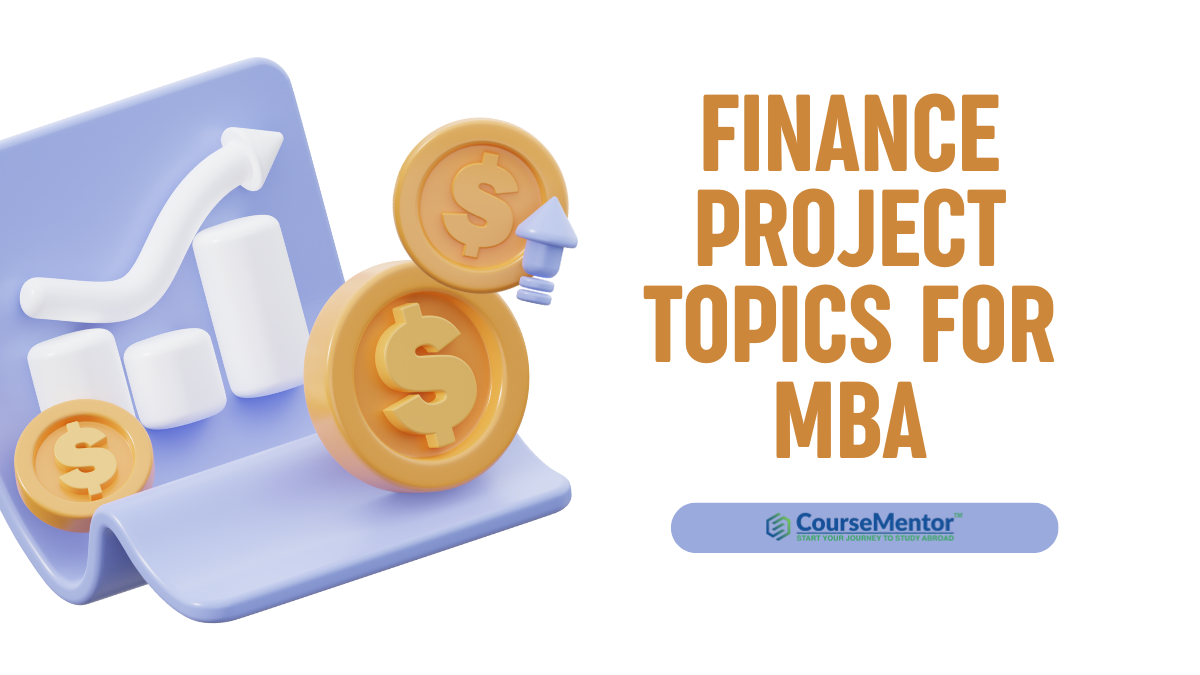
- Post author By admin
- May 4, 2024
- No Comments on Top 101 Finance Project Topics For MBA [2024]
In the dynamic world of finance, MBA students often find themselves navigating through a sea of potential project topics. These projects are not just academic exercises but gateways to real-world applications and career opportunities. But with so many options available, how does one choose the right finance project topic? Let’s delve into this question and explore some fascinating avenues for finance project topics for MBA.
Table of Contents
Factors to Consider in Selecting a Finance Project Topic
When selecting a finance project topic, several factors come into play:
- Personal Interest and Career Goals: Choose a topic that aligns with your interests and career aspirations.
- Relevance to Industry Trends: Select a topic that addresses current issues and trends in the finance industry.
- Availability of Data and Resources: Ensure that sufficient data and resources are available to support your research.
- Potential for Contribution to Existing Knowledge: Aim to contribute new insights or perspectives to the existing body of knowledge in finance.
What Are The Most Important Finance Topics?
Determining the “most important” finance topics can vary depending on various factors such as current economic conditions, industry trends, and individual interests. However, several foundational finance topics are generally considered crucial for understanding the principles and mechanisms of finance. Here are some of the most important finance topics:
- Financial Analysis and Reporting: Understanding how to analyze financial statements, assess financial health, and interpret key financial ratios is essential for decision-making in both corporate finance and investment management.
- Corporate Finance: Topics such as capital budgeting, capital structure, dividend policy, and mergers and acquisitions are fundamental to understanding how businesses allocate resources, raise capital, and maximize shareholder value.
- Investment Management: Concepts like portfolio theory, asset allocation, risk management, and valuation techniques are vital for managing investment portfolios effectively and achieving investment objectives.
- Financial Markets and Institutions: Knowledge of financial markets, including stock markets, bond markets, foreign exchange markets, and their instruments, as well as understanding the role of financial institutions like banks, investment banks, and insurance companies, is crucial for understanding the broader financial system.
- Risk Management: Knowing about different kinds of financial risks like credit risk, market risk, liquidity risk, and operational risk, and figuring out how to spot, measure, and handle these risks is super important. It helps keep financial institutions and investment portfolios strong and able to bounce back from tough times.
- Financial Modeling and Forecasting: Skills in financial modeling, including building cash flow models, forecasting financial performance, and conducting scenario analysis, are valuable for making informed financial decisions and conducting financial analysis.
- Behavioral Finance: Understanding how psychological biases and cognitive errors influence investor behavior and market outcomes is increasingly important for recognizing and mitigating behavioral biases in financial decision-making.
- Regulatory Environment and Compliance: Knowledge of financial regulations, compliance requirements, and ethical considerations is essential for navigating the legal and regulatory framework governing financial markets and institutions and ensuring adherence to ethical standards.
Top 101 Finance Project Topics For MBA: Category Wise
Financial analysis and reporting.
- Comparative Analysis of Financial Statements of Companies in [Industry]
- Trend Analysis of Key Financial Ratios Over a Five-Year Period
- Financial Performance Evaluation of [Company] Compared to Industry Peers
- Analysis of Working Capital Management Efficiency in [Industry]
- Assessing the Impact of Economic Indicators on Financial Performance
Portfolio Management and Investment
- Designing an Optimal Portfolio Strategy for Long-Term Wealth Accumulation
- Evaluating the Performance of Mutual Funds in Different Market Conditions
- Risk-Return Analysis of Various Investment Instruments
- Impact of Macroeconomic Factors on Stock Market Returns
- Developing a Diversification Strategy for Investment Portfolios
Risk Management
- Credit Risk Assessment Models in Banking Sector
- Stress Testing the Resilience of Financial Institutions to Economic Shocks
- Evaluating the Effectiveness of Derivatives in Hedging Financial Risks
- Operational Risk Management in Financial Services Industry
- Cybersecurity Risks and Their Impact on Financial Institutions
Corporate Finance
- Capital Structure Optimization for Maximizing Shareholder Value
- Valuation of Mergers and Acquisitions: Case Studies
- Dividend Policy and Its Impact on Shareholder Wealth
- Leveraged Buyouts: Analysis and Implications
- Corporate Governance Practices and Firm Performance
Financial Markets and Instruments
- Analysis of Stock Market Volatility: Causes and Implications
- Impact of Interest Rate Changes on Bond Prices and Yields
- Efficiency of Foreign Exchange Markets: Evidence from Emerging Economies
- Commodity Price Forecasting Models and Their Accuracy
- Behavioral Finance: Understanding Investor Sentiment and Market Anomalies
International Finance
- Foreign Direct Investment Trends in Developing Countries
- Exchange Rate Determination and Its Impact on International Trade
- Managing Currency Risk in International Business Operations
- International Capital Budgeting Techniques: Comparative Analysis
- Political and Economic Risks in Global Investment Decision Making
Financial Modeling and Forecasting
- Building a Cash Flow Forecasting Model for Small Businesses
- Predictive Analytics in Financial Services: Applications and Challenges
- Time Series Analysis of Financial Data: Techniques and Interpretation
- Scenario Analysis for Strategic Financial Planning
- Monte Carlo Simulation for Assessing Investment Risks
Behavioral Finance
- Psychological Biases in Investment Decision Making: A Literature Review
- Herding Behavior in Financial Markets: Causes and Consequences
- Overconfidence and Its Impact on Investment Performance
- Anchoring and Adjustment Heuristics in Financial Decision Making
- Neurofinance: Exploring the Brain’s Role in Financial Decision Making
Sustainable Finance and ESG Investing
- Environmental, Social, and Governance (ESG) Integration in Investment Portfolios
- Impact Investing: Assessing Social and Environmental Returns
- Carbon Pricing Mechanisms and Their Implications for Financial Markets
- Green Bonds: Market Trends and Investment Opportunities
- Corporate Social Responsibility Reporting and Its Impact on Investor Decisions
Fintech and Innovation
- Blockchain Technology in Finance: Applications and Challenges
- Peer-to-Peer Lending Platforms: Disrupting Traditional Banking
- Robo-Advisors: The Future of Wealth Management
- Regtech Solutions for Compliance Management in Financial Institutions
- Open Banking Initiatives and Their Impact on Financial Services Industry
Financial Inclusion and Microfinance
- Access to Finance for Small and Medium Enterprises (SMEs): Challenges and Solutions
- Microfinance Institutions: Impact Assessment and Sustainability
- Gender Lens Investing: Promoting Financial Inclusion for Women
- Rural Finance: Strategies for Bridging the Urban-Rural Divide
- Financial Literacy Programs: Evaluating Effectiveness and Outreach
Real Estate Finance
- Real Estate Investment Trusts (REITs): Performance Analysis and Investment Strategies
- Housing Finance in Developing Countries: Challenges and Opportunities
- Commercial Real Estate Valuation Techniques: Comparative Analysis
- Real Estate Crowdfunding: A New Avenue for Property Investment
- Real Estate Market Dynamics: Case Studies from Global Cities
Banking and Financial Institutions
- Retail Banking Strategies in the Digital Age: Case Studies
- Non-Performing Loans: Causes, Implications, and Remedial Measures
- Financial Inclusion Initiatives by Banks: Impact Assessment
- Islamic Banking: Principles, Products, and Growth Prospects
- Financial Regulation and Supervision: Challenges in a Globalized World
Financial Econometrics
- Panel Data Analysis in Finance: Applications and Interpretation
- GARCH Models for Volatility Forecasting: Empirical Evidence
- Co-Integration Analysis in Financial Time Series Data
- Machine Learning Techniques for Financial Forecasting
- High-Frequency Trading: Strategies and Market Microstructure
Venture Capital and Private Equity
- Venture Capital Financing: Trends and Investment Criteria
- Private Equity Buyouts: Structuring Deals and Creating Value
- Startup Valuation Methods: Comparing Approaches
- Angel Investing: Opportunities and Risks for High-Net-Worth Individuals
- Secondary Market for Private Equity: Liquidity and Pricing Dynamics
Financial Regulation and Compliance
- Basel III Framework: Implications for Banking Sector Stability
- Anti-Money Laundering (AML) Compliance: Challenges and Best Practices
- Dodd-Frank Act: Impact on Financial Institutions and Markets
- Insider Trading Regulations: Enforcement and Deterrence
- Corporate Governance Codes and Their Impact on Firm Performance
Financial Derivatives
- Options Trading Strategies: Risk Management and Profit Maximization
- Futures Markets: Trading Mechanisms and Hedging Strategies
- Swaps and Their Role in Managing Interest Rate and Currency Risks
- Credit Default Swaps: Pricing Models and Market Dynamics
- Weather Derivatives: Applications in Agriculture and Energy Sectors
Financial Education and Literacy
- Financial Planning for Young Professionals: Strategies for Wealth Accumulation
- Retirement Planning: Investment Options and Pension Products
- Personal Finance Management Apps: User Adoption and Effectiveness
- Financial Education in Schools: Curriculum Development and Impact Assessment
- Behavioral Economics in Personal Finance: Nudging for Better Financial Decisions
Corporate Restructuring and Bankruptcy
- Distressed Debt Investing: Strategies and Risks
- Chapter 11 Bankruptcy : Process, Outcomes, and Stakeholder Interests
- Turnaround Strategies for Troubled Companies: Case Studies
- Mergers and Acquisitions in Bankruptcy: Legal and Financial Considerations
- Pre-Packaged Bankruptcy: Advantages and Limitations
Financial Ethics and Corporate Social Responsibility
- Ethical Investment Practices: Screening Criteria and Performance
- Corporate Governance and Ethical Leadership: Case Studies
- Socially Responsible Investing: Aligning Values with Investment Goals
- Ethical Dilemmas in Financial Decision Making: Case Analyses
- Transparency and Disclosure: Enhancing Corporate Accountability
- The Role of Finance in Sustainable Development Goals: A Case for Responsible Investing
Selecting a finance project topic is a critical decision for MBA students, as it sets the stage for their research journey and future career endeavors.
By considering factors such as personal interests, industry trends, data availability, and potential contributions to knowledge, students can identify compelling topics that align with their goals and aspirations.
Whether exploring traditional finance topics or emerging trends, conducting rigorous research methodology is essential for project success. So, dive into the world of finance project topics for MBA with enthusiasm and curiosity, and unlock new insights into the fascinating realm of finance.
Leave a Reply Cancel reply
You must be logged in to post a comment.
- australia (2)
- duolingo (13)
- Education (281)
- General (75)
- How To (16)
- IELTS (127)
- Latest Updates (162)
- Malta Visa (6)
- Permanent residency (1)
- Programming (31)
- Scholarship (1)
- Sponsored (4)
- Study Abroad (187)
- Technology (12)
- work permit (8)
Recent Posts

Top 15 MBA Project Ideas & Topics in 2023 [For Freshers]
![mba project on education industry Top 15 MBA Project Ideas & Topics in 2023 [For Freshers]](https://www.upgrad.com/__khugblog-next/image/?url=https%3A%2F%2Fd14b9ctw0m6fid.cloudfront.net%2Fugblog%2Fwp-content%2Fuploads%2F2021%2F01%2F1648.png&w=1920&q=75)
In this article, you will learn the Top 15 MBA Project Ideas & Topics. Take a glimpse below.
- A study on sustainable business models across the consumer internet startups in India.
- A study on various investment options available in India, their popularity, advantages, disadvantages, and growth of these investment options in the last decade
- A study on risk management and portfolio management of investors in the equity segment
- Analysis of working capital management at high cash burn startups in the food tech space
- Impact of GST on the fast-moving consumer goods sector in India
- Analysis of the satisfaction level of employees in the Banking and financial services sector
- A study on the various employee welfare schemes at Hindustan Unilever
- Analysis of employee training needs in State Bank of India
- Comparative Study & Analysis Of NPA(Non-Performing Asset) In Indian Banks and Financial Institutions
- Analysis of financial statements of ICICI Bank for the last 5 Years
Read the entire article to learn all the topic ideas.
Introduction
The best part about going ahead for an MBA is the practical learning experience it provides in the form of projects and case studies that enhance your overall learning experience. The projects may be individual projects or group projects where you learn how to analyze case studies, understand the project topic, work in teams, and complete projects within a timeline.
We take a look at some of the best and unique project topics that you can select during your MBA program across Marketing, HR, Finance, Analytics, Operations, etc. The article also highlights some of the top business analytics projects for MBA students and innovative MBA IT project topics.

What is an MBA?
The Master of Business Administration (MBA) is a prestigious and versatile postgraduate degree that equips students with a comprehensive understanding of various aspects of business management. The program prepares individuals for leadership roles in various industries and sectors. With its emphasis on developing critical thinking, strategic planning, and effective communication skills, an MBA can significantly enhance career prospects and open doors to various opportunities.
What are the benefits of doing an MBA in any field?
1. knowledge and skill enrichment.
MBA programs cover various subjects such as finance, marketing, operations, human resources, entrepreneurship, and more. This holistic curriculum equips students with a well-rounded understanding of how different business functions interconnect.
Case studies, real-world projects, and interactive classroom discussions provide practical insights, fostering problem-solving and analytical skills.
2. Leadership and Management Acumen
MBA programs emphasize leadership development and nurturing skills to effectively manage teams, projects, and organizations.
Students learn about decision-making, conflict resolution, negotiation, and organizational behavior, which are crucial for successful leadership roles.
3. Networking Opportunities
MBA programs often have a diverse student body with professionals from various industries, cultures, and backgrounds. This creates a fertile ground for networking.
Interaction with peers, alums, faculty, and guest speakers can lead to valuable connections that can benefit one’s career.
4. Career Advancement
An MBA can accelerate career growth by opening doors to higher-level positions and greater responsibilities.
Graduates are better equipped to navigate the complexities of the business world, making them attractive candidates for promotions and leadership roles.
5. Entrepreneurial Spirit
Many MBA programs offer specialized tracks or courses in entrepreneurship, providing aspiring business owners with the skills needed to launch and manage their ventures.
Exposure to real-world business challenges and opportunities encourages innovative thinking and risk-taking.
6. Global Perspective
In an increasingly interconnected world, MBA programs often include international business components that expose students to global market trends, cultural nuances, and international business strategies.
7. Personal Development
The rigorous demands of an MBA program foster time management, discipline, and the ability to handle high-pressure situations.
Students often gain a deeper understanding of their strengths, weaknesses, and areas for personal growth.
8. Enhanced Earning Potential
On average, MBA graduates earn higher salaries than those with only undergraduate degrees.
The specialized knowledge and leadership skills gained during the program contribute to increased marketability and value in the job market.
9. Career Switching and Flexibility
An MBA can serve as a bridge for professionals looking to switch industries or career paths.
The broad skill set acquired during the program enables graduates to pivot and adapt to different sectors.
10. Credibility and Prestige
An MBA from a reputable institution carries weight and prestige in the business world.
Employers often perceive MBA holders as dedicated, knowledgeable, and committed individuals due to the intensive nature of the program.
11. Access to Resources
Many MBA programs provide access to extensive resources such as libraries, research centers, industry partnerships, and career services, which can aid academic and professional pursuits.
12. Lifelong Learning and Growth
The learning mindset cultivated during an MBA often continues beyond graduation. Many professionals engage in continuous learning, staying updated with evolving business trends.
Pursuing an MBA offers students a transformative educational experience beyond theoretical learning. It equips them with the skills, knowledge, and networks needed to excel in the competitive business. The benefits encompass personal growth, career advancement, entrepreneurship, and the ability to make a meaningful impact in various industries. However, it’s important for prospective students to carefully consider their career goals, program options, and the reputation of institutions before embarking on this enriching journey of business education.
Read: Check out the Scope of MBA for IT professionals.
Top MBA Project Ideas
Currently, there are various general mba research project topics available in the market. Choosing the best one can seem to be quite a tedious process. Therefore, we have selected some of the best general mini project ideas for mba students highlighted in the list below.
Before delving into the different general mba project title, it is important to remember you, as a student, need to choose the topic that is closest to your specialization.
Internet Startups are known to burn cash to transform business at scale while also creating a habit in people, however many of them incur heavy losses because their business models are not sustainable.
There are lots of investment options available from mutual funds, stocks, physical gold, digital gold, bonds, etc but very few of these are popular except physical cold. Each of these investment options has their own advantages & advantages. Have they grown in the last 10 years?
Get online MBA certifications from the World’s top Universities. Earn Masters, Executive PGP, or Advanced Certificate Programs to fast-track your career.
The equity segment is known to carry a high risk, how do investors manage this risk? Portfolio management is also crucial and helps investors avoid losses and increase their gains
- Analysis of working capital management at high cash burn startups in the food tech space.
Working capital is the liquidity required to meet daily needs. In startups in the food-tech space where there is a lot of cash burn, how is working capital management done?
The Goods and Services tax bill has had a huge impact on many sectors. What has been the impact of GST on the FMCG sector which is one of the largest consumer-oriented sectors in India?
Read: Best MBA Online Courses
- Analysis of the satisfaction level of employees in the Banking and financial services sector.
Banking & financial services is a crucial sector employing lakhs of employees. The work environments are known to be stressful and the work is tedious. So what is the satisfaction level of employees in this sector?
Hindustan Unilever is one of India’s biggest and most famous brands in the FMCG sector. They employ hundreds of people and they are known to be employee-friendly with a lot of employee-friendly policies & welfare schemes.
Our learners also read: MBA job opportunities !
- Analysis of employee training needs in State Bank of India.
SBI is one of the largest banks in India and employee lakhs of people. This also means all the employees need to be trained at regular intervals. What would be the employee training needs in the banking industry?
Checkout: Best Online MBA Courses in India
India’s NPA ratio is one the highest in the world and it may increase further at the end of the current fiscal year 2021-22. What has contributed to this and what is the comparative situation among Indian banks & financial institutions?
ICICI bank is one of the top private sector banks in India. What does the analysis of ICICI bank financial statements for the last 5 years tell you about the company and its performance?
- Study on consumer behavioral pattern in the FMCG category of toothpaste in the case of Colgate & Patanjali.
Colgate is one of the top brands in the category of toothpaste and Patanjali Dant Kanti has been a recent challenger with a focus on ayurvedic products. What are the consumer behaviour patterns driving this toothpaste category?
- Study of marketing promotions & strategy in the luxury retail market for Louis Vuitton
Luxury marketing communications & strategy are very different compared to a non luxury brand. Louis Vuitton is one of the most famous luxury brands in India. What kind of marketing promotions and strategies did Louis Vuitton use?
- Analysis of YouTube ads in digital marketing to reach mass audiences and its comparative effectiveness compared to TV adverting in FMCG industry
Youtube has quickly emerged as a powerful medium for brand marketing and its adoption has accelerated in the last 2-3 years. But is it more effective than TV in order to reach a brand’s target audiences?
Explore our Popular MBA Courses
- Analysis of Total Quality Management Implementation at Marico.
Marico is one of India’s well known and top brands with respect to quality. How has Total Quality management helped them achieve high consumer satisfaction?
Also Read: Top Paying Cities for MBA in India
- A Study of Six Sigma Implementation Process at a manufacturing company.
Six sigma is a set of techniques and tools that help to improve business processes in an organization. How has the implementation process been at a manufacturing company?
Read: Career in marketing and its scope in the US market.
Best Business Analytics Project Topics For MBA
Here are the best social relevance project topics for mba for candidates which are different from general project topics for MBA students, and significantly offer greater value!
In this today’s technology-driven world, business analytics is one of the most sought-after fields. Almost all big enterprises and organizations rely on business analytics for well-informed decisions and planning. This has led to such an increased demand for this field that many universities from all around India are offering various lucrative Business Analytics courses to their students. We have prepared some of the best business analytics project topics for MBA that are mentioned below.
- Sales Conversion Optimization
Companies rely heavily on traditional and digital marketing and campaigns to drive their sales and attract new customers. Email and social media marketing are two of the widely used methods in this regard.
- A Study On Predicting Sales Of A Supermarket During Festival Season
A supermarket consists of various departments, and each is responsible for stocking up its items in a regulated manner. However, while doing so, it is important to check that it does not have any excessive stock, which can ultimately lead to a potential loss for the business. This is where forecasting sales come into play. Predicting the demand for particular goods during festive seasons can help to generate profit and avoid loss for a business.
- Understanding Employee Attrition And Performance
Various factors can lead to employee attrition. A detailed understanding of all the factors will help companies retain their employees’ loyalty more efficiently. Furthermore, companies can also then make changes in their business environments so that they can hold on to their best employees.
These are some of the best topics currently available for business analytics projects for MBA students . Working on a good project not only adds that extra spark to a person’s resume but also helps boost your technical skills and highlights your maturity.
Innovative Product Ideas For MBA Students
One of the most challenging tasks every entrepreneur faces is deciding what to sell. Whether it is a completely new product or starting a new business with different related products, it can sometimes be difficult to come up with something new and innovative. If you are facing any of these challenges, don’t worry. We are here to help you with the same. The mentioned below list contains some of the latest innovative product ideas for MBA students.
- At-home fitness equipment
Following the onset of lockdown during this pandemic, many gyms and other workout facilities had to shut down their offices to comply with government protocols. During this time, at-home fitness equipment witnessed a drastic bloom and became hugely popular among the mass. Some of the most popular at-home fitness equipment include yoga mats, stationary bikes, and resistance bands.
- Mobile Phone Accessories
India currently has 1.2 billion smartphone users. This means that these 1.2 billion users are your potential customers when you sell smartphone accessories. The most popular phone accessories are designed to increase your cellphones’ efficiency and usefulness and make them less breakable.
- Internet Of Thing Devices
With the evolution of technology, more and more products are slowly transitioning into IoT devices. To put it simply, IoT devices are referred to as those that are equipped with various software and sensors to connect with other systems and devices over the Internet easily. Some examples of these devices are smartwatches, smart light bulbs, and smart cars, among others.
MBA Programs in India
You can consider some of these world class MBA programs offered by top institutions. One of the top MBA learning platforms in India, upGrad can help you apply for an MBA from Liverpool Business School with specialization in marketing.
u pGrad also offers individual mentoring sessions with industry leaders from various domains. You will also get 360-degree career support and placement assistance throughout the MBA program that will help you apply for a job with some of the top brands. upGrad expert mentors will guide you and help you build, review your resume and help you apply for various marketing & business roles across various brands.
Check out Liverpool Business School & upGrad’ Global MBA program which helps you to transform your career. The program provides 1-on-1 mentorship from industry leaders, 1-week immersion program at University campus, dual credentials (MBA from LBS & PGPM from IMT), network with peers at offline basecamps and more.

Kamal Jacob
Something went wrong
MBA Skills to Master
- MBA in Finance Courses
- MBA in HR Courses
- MBA in Marketing Courses
- Introduction to FinTech Courses
- MBA in Agriculture Courses
- MBA in Operations Management Courses
- MBA in International Business Courses
- MBA in IT Management Courses
- MBA In Healthcare Management Courses
- MBA in General Management Courses
- MBA Supply Chain Management Courses
- MBA in Entrepreneurship Courses
- MBA in Project Management Courses
Our Trending MBA Courses
- MBA (Global) Deakin Business School & IMT
- Global MBA Liverpool Business School
- NMIMS MBA Executive with Specialisation in Business Analytics
- MBA From Golden Gate University
- Job-linked Advanced General Management from IMT Ghaziabad
- MBA (Global) Deakin Business School
Our Popular MBA Course
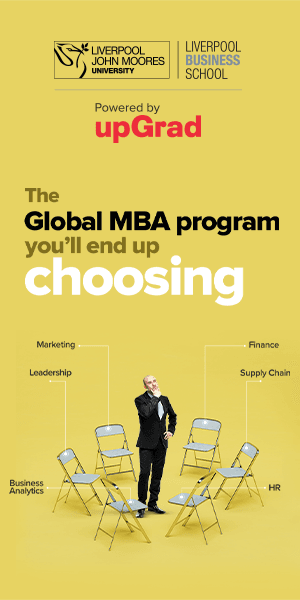
Frequently Asked Questions (FAQs)
To successfully complete an MBA program, doing an MBA project is important. This will also help you in the real world when you’re looking for jobs. However, the project topic you choose should be something that aligns with your goals and future objectives. Here are a few tips that will help you select a good topic – spend ample time researching on the internet, speak to your seniors and get ideas from them, discuss your shortlisted topics with mentors and professors, choose a topic that matches your future career aspirations, and lastly the topic you choose should be of interest to you.
When you do an MBA program from upGrad, there are many benefits. Besides training students in various subjects, it also offers end-to-end career assistance. Every student gets personalised career counselling from experts, specific inputs on resume structure and content, interview preparation tips by industry mentors and assured job placement offered by 300+ companies partnered with upGrad. The main agenda of every program is offering students unparalleled guidance from teaching assistants and one-on-one feedback on submissions.
MBA graduates are known to earn handsome salaries. The salary earned by MBA passouts in India is primarily based on their overall work or industry experience and their qualifications. That being said, their salary also depends on their MBA specialisation. Usually, those who opt for specialisations such as HR, finance, marketing, and business analytics, are observed to bag jobs with the highest compensation packages. Securing a seat in any of the premier MBA colleges in the country is a bonus since the top business schools offer exceptional placement opportunities with lucrative salaries; the numbers can range from INR 4-14 lakhs an annum for freshers to INR 25 lakhs a year for experienced professionals.
While all of us respect and envy the brilliant career paths of MBA graduates, we often tend to overlook the level of extreme hard work they have had to put in before bagging that dream job. If you ask MBA graduates, you will come to know that studying MBA is indeed taxing. You need to flourish in a highly competitive environment and have to give your best performance all-round, be it practical projects or academics. And the tremendous volume of things that need to be completed, along with the sheer lack of time for self-preparation, studies, or even family, can pose as reasons for enormous stress throughout the study.
HR managers have to deal with employee layoffs, organisational policy violations, payrolls, and company-wide communications. The basic job of the HR manager is to oversee and look after employee life-cycle management, including onboarding, recruitment, training, employee termination, and of course, employee benefits. Basically, human resources managers are responsible for supporting the employees by updating company policies, maintaining records of employees and supporting their career aspirations and growth, facilitating employee education, training and supporting managers, ensuring employee wellbeing and welfare, and enforcing disciplinary action in an unbiased and prudent manner.
Related Programs View All

Master's Degree
View Program

WES Recognized MBA degree

AACSB & EQUIS accredited

WES Recognised

AACSB & AICTE accredited

Certification
Top Indian B-School

Recognized as Institute of Eminence (MHRD)
70% Scholarship available
Immediate Program Start

5 Top Specialisations

Job Assistance with Minimum 3.5L CTC

Leadership Development
13 Specialisations Available
Dual Credentials

Offline Campus Experience
ACBSP and HLC Accredited Program
AACSB accredited

Explore Free Courses
Learn more about the education system, top universities, entrance tests, course information, and employment opportunities in Canada through this course.
Advance your career in the field of marketing with Industry relevant free courses
Build your foundation in one of the hottest industry of the 21st century
Master industry-relevant skills that are required to become a leader and drive organizational success
Build essential technical skills to move forward in your career in these evolving times
Get insights from industry leaders and career counselors and learn how to stay ahead in your career
Kickstart your career in law by building a solid foundation with these relevant free courses.
Stay ahead of the curve and upskill yourself on Generative AI and ChatGPT
Build your confidence by learning essential soft skills to help you become an Industry ready professional.
Learn more about the education system, top universities, entrance tests, course information, and employment opportunities in USA through this course.
Suggested Blogs

by Kamal Jacob
25 May 2024
![mba project on education industry MBA Salary in India in 2024 [For Freshers & Experienced]](https://www.upgrad.com/__khugblog-next/image/?url=https%3A%2F%2Fd14b9ctw0m6fid.cloudfront.net%2Fugblog%2Fwp-content%2Fuploads%2F2019%2F07%2FBlog_FI_July_upGrads-Career-advice.png&w=3840&q=75)
by Rahul Karthikeyan
19 May 2024
![mba project on education industry Top 10 Highest Paying HR Jobs in India [A Complete Report]](https://www.upgrad.com/__khugblog-next/image/?url=https%3A%2F%2Fd14b9ctw0m6fid.cloudfront.net%2Fugblog%2Fwp-content%2Fuploads%2F2020%2F11%2F1143_Highest-Paying-HR-Jobs-in-India.png&w=3840&q=75)
18 May 2024
![mba project on education industry 20 Best Career Options after B.Com 2024: What to do After B.Com? [updated]](https://www.upgrad.com/__khugblog-next/image/?url=https%3A%2F%2Fd14b9ctw0m6fid.cloudfront.net%2Fugblog%2Fwp-content%2Fuploads%2F2020%2F01%2F21-banner.png&w=3840&q=75)
by Keerthi Shivakumar
16 Apr 2024
![mba project on education industry Top 14 Career Options After MBA In HR [Trending in 2024]](https://www.upgrad.com/__khugblog-next/image/?url=https%3A%2F%2Fd14b9ctw0m6fid.cloudfront.net%2Fugblog%2Fwp-content%2Fuploads%2F2019%2F07%2FBlog_FI_July_upGrads-Knowledge-base.png&w=3840&q=75)
by Dilip Guru
07 Apr 2024

by venkatesh Rajanala
01 Mar 2024

by Harish K

29 Feb 2024

by spandita hati
Research Topics & Ideas: Business
50+ Management Research Topic Ideas To Fast-Track Your Project

Finding and choosing a strong research topic is the critical first step when it comes to crafting a high-quality dissertation, thesis or research project. If you’ve landed on this post, chances are you’re looking for a business/management-related research topic , but aren’t sure where to start. Here, we’ll explore a variety of research ideas and topic thought-starters for management-related research degrees (MBAs/DBAs, etc.). These research topics span management strategy, HR, finance, operations, international business and leadership.
NB – This is just the start…
The topic ideation and evaluation process has multiple steps . In this post, we’ll kickstart the process by sharing some research topic ideas within the management domain. This is the starting point, but to develop a well-defined research topic, you’ll need to identify a clear and convincing research gap , along with a well-justified plan of action to fill that gap.
If you’re new to the oftentimes perplexing world of research, or if this is your first time undertaking a formal academic research project, be sure to check out our free dissertation mini-course. In it, we cover the process of writing a dissertation or thesis from start to end. Be sure to also sign up for our free webinar that explores how to find a high-quality research topic.
Overview: Business Research Topics
- Business /management strategy
- Human resources (HR) and industrial psychology
- Finance and accounting
- Operations management
- International business
- Actual business dissertations & theses
Strategy-Related Research Topics
- An analysis of the impact of digital transformation on business strategy in consulting firms
- The role of innovation in transportation practices for creating a competitive advantage within the agricultural sector
- Exploring the effect of globalisation on strategic decision-making practices for multinational Fashion brands.
- An evaluation of corporate social responsibility in shaping business strategy, a case study of power utilities in Nigeria
- Analysing the relationship between corporate culture and business strategy in the new digital era, exploring the role of remote working.
- Assessing the impact of sustainability practices on business strategy and performance in the motor vehicle manufacturing industry
- An analysis of the effect of social media on strategic partnerships and alliances development in the insurance industry
- Exploring the role of data-driven decision-making in business strategy developments following supply-chain disruptions in the agricultural sector
- Developing a conceptual framework for assessing the influence of market orientation on business strategy and performance in the video game publishing industry
- A review of strategic cost management best practices in the healthcare sector of Indonesia
- Identification of key strategic considerations required for the effective implementation of Industry 4.0 to develop a circular economy
- Reviewing how Globalisation has affected business model innovation strategies in the education sector
- A comparison of merger and acquisition strategies’ effects on novel product development in the Pharmaceutical industry
- An analysis of market strategy performance during recessions, a retrospective review of the luxury goods market in the US
- Comparing the performance of digital stakeholder engagement strategies and their contribution towards meeting SDGs in the mining sector

Topics & Ideas: Human Resources (HR)
- Exploring the impact of digital employee engagement practices on organizational performance in SMEs
- The role of diversity and inclusion in the workplace
- An evaluation of remote employee training and development programs efficacy in the e-commerce sector
- Comparing the effect of flexible work arrangements on employee satisfaction and productivity across generational divides
- Assessing the relationship between gender-focused employee empowerment programs and job satisfaction in the UAE
- A review of the impact of technology and digitisation on human resource management practices in the construction industry
- An analysis of the role of human resource management in talent acquisition and retention in response to globalisation and crisis, a case study of the South African power utility
- The influence of leadership style on remote working employee motivation and performance in the education sector.
- A comparison of performance appraisal systems for managing employee performance in the luxury retail fashion industry
- An examination of the relationship between work-life balance and job satisfaction in blue-collar workplaces, A systematic review
- Exploring HR personnel’s experiences managing digital workplace bullying in multinational corporations
- Assessing the success of HR team integration following merger and acquisition on employee engagement and performance
- Exploring HR green practices and their effects on retention of millennial talent in the fintech industry
- Assessing the impact of human resources analytics in successfully navigating digital transformation within the healthcare sector
- Exploring the role of HR staff in the development and maintenance of ethical business practices in fintech SMEs
- An analysis of employee perceptions of current HRM practices in a fully remote IT workspace

Topics & Ideas: Finance & Accounting
- An analysis of the effect of employee financial literacy on decision-making in manufacturing start-ups in Ghana
- Assessing the impact of corporate green innovation on financial performance in listed companies in Estonia
- Assessing the effect of corporate governance on financial performance in the mining industry in Papua New Guinea
- An evaluation of financial risk management practices in the construction industry of Saudi Arabia
- Exploring the role of leadership financial literacy in the transition from start-up to scale-up in the retail e-commerce industry.
- A review of influential macroeconomic factors on the adoption of cryptocurrencies as legal tender
- An examination of the use of financial derivatives in risk management
- Exploring the impact of the cryptocurrency disruption on stock trading practices in the EU
- An analysis of the relationship between corporate social responsibility and financial performance in academic publishing houses
- A comparison of financial ratios performance in evaluating E-commerce startups in South Korea.
- An evaluation of the role of government policies in facilitating manufacturing companies’ successful transitioning from start-up to scale-ups in Denmark
- Assessing the financial value associated with industry 4.0 transitions in the Indian pharmaceutical industry
- Exploring the role of effective e-leadership on financial performance in the Nigerian fintech industry
- A review of digital disruptions in CRM practices and their associated financial impact on listed companies during the Covid-19 pandemic
- Exploring the importance of Sharia-based business practices on SME financial performance in multicultural countries

Ideas: Operations Management
- An assessment of the impact of blockchain technology on operations management practices in the transport industry of Estonia
- An evaluation of supply chain disruption management strategies and their impact on business performance in Lithuania
- Exploring the role of lean manufacturing in the automotive industry of Malaysia and its effects on improving operational efficiency
- A critical review of optimal operations management strategies in luxury goods manufacturing for ensuring supply chain resilience
- Exploring the role of globalization on Supply chain diversification, a pre/post analysis of the COVID-19 pandemic
- An analysis of the relationship between quality management and customer satisfaction in subscription-based business models
- Assessing the cost of sustainable sourcing practices on operations management and supply chain resilience in the Cocao industry.
- An examination of the adoption of behavioural predictive analytics in operations management practices, a case study of the
- Italian automotive industry
- Exploring the effect of operational complexity on business performance following digital transformation
- An evaluation of barriers to the implementation of agile methods in project management within governmental institutions
- Assessing how the relationship between operational processes and business strategy change as companies transition from start-ups to scale-ups
- Exploring the relationship between operational management and innovative business models, lessons from the fintech industry
- A review of best practices for operations management facilitating the transition towards a circular economy in the fast food industry
- Exploring the viability of lean manufacturing practices in Vietnam’s plastics industry
- Assessing engagement in cybersecurity considerations associated with operations management practices in industry 4.0 manufacturing

Topics & Ideas: International Business
- The impact of cultural differences in communication on international business relationships
- An evaluation of the role of government import and export policies in shaping international business practices
- The effect of global shipping conditions on international business strategies
- An analysis of the challenges of managing multinational corporations: branch management
- The influence of social media marketing on international business operations
- The role of international trade agreements on business activities in developing countries
- An examination of the impact of currency fluctuations on international business and cost competitiveness
- The relationship between international business and sustainable development: perspectives and benefits
- An evaluation of the challenges and opportunities of doing business in emerging markets such as the renewable energy industry
- An analysis of the role of internationalisation via strategic alliances in international business
- The impact of cross-cultural management on international business performance
- The effect of political instability on international business operations: A case study of Russia
- An analysis of the role of intellectual property rights in an international technology company’s business strategies
- The relationship between corporate social responsibility and international business strategy: a comparative study of different industries
- The impact of technology on international business in the fashion industry
Topics & Ideas: Leadership
- A comparative study of the impact of different leadership styles on organizational performance
- An evaluation of transformational leadership in today’s non-profit organizations
- The role of emotional intelligence in effective leadership and productivity
- An analysis of the relationship between leadership style and employee motivation
- The influence of diversity and inclusion on leadership practices in South Africa
- The impact of Artificial Intelligence technology on leadership in the digital age
- An examination of the challenges of leadership in a rapidly changing business environment: examples from the finance industry
- The relationship between leadership and corporate culture and job satisfaction
- An evaluation of the role of transformational leadership in strategic decision-making
- The use of leadership development programs in enhancing leadership effectiveness in multinational organisations
- The impact of ethical leadership on organizational trust and reputation: an empirical study
- An analysis of the relationship between various leadership styles and employee well-being in healthcare organizations
- The role of leadership in promoting good work-life balance and job satisfaction in the age of remote work
- The influence of leadership on knowledge sharing and innovation in the technology industry
- An investigation of the impact of cultural intelligence on cross-cultural leadership effectiveness in global organizations
Business/Management Dissertation & Theses
While the ideas we’ve presented above are a decent starting point for finding a business-related research topic, they are fairly generic and non-specific. So, it helps to look at actual dissertations and theses to see how this all comes together.
Below, we’ve included a selection of research projects from various management-related degree programs (e.g., MBAs, DBAs, etc.) to help refine your thinking. These are actual dissertations and theses, written as part of Master’s and PhD-level programs, so they can provide some useful insight as to what a research topic looks like in practice.
- Sustaining Microbreweries Beyond 5 Years (Yanez, 2022)
- Perceived Stakeholder and Stockholder Views: A Comparison Among Accounting Students, Non-Accounting Business Students And Non-Business Students (Shajan, 2020)
- Attitudes Toward Corporate Social Responsibility and the New Ecological Paradigm among Business Students in Southern California (Barullas, 2020)
- Entrepreneurial opportunity alertness in small business: a narrative research study exploring established small business founders’ experience with opportunity alertness in an evolving economic landscape in the Southeastern United States (Hughes, 2019)
- Work-Integrated Learning in Closing Skills Gap in Public Procurement: A Qualitative Phenomenological Study (Culver, 2021)
- Analyzing the Drivers and Barriers to Green Business Practices for Small and Medium Enterprises in Ohio (Purwandani, 2020)
- The Role of Executive Business Travel in a Virtual World (Gale, 2022)
- Outsourcing Security and International Corporate Responsibility: A Critical Analysis of Private Military Companies (PMCs) and Human Rights Violations (Hawkins, 2022)
- Lean-excellence business management for small and medium-sized manufacturing companies in Kurdistan region of Iraq (Mohammad, 2021)
- Science Data Sharing: Applying a Disruptive Technology Platform Business Model (Edwards, 2022)
- Impact of Hurricanes on Small Construction Business and Their Recovery (Sahu, 2022)
Looking at these titles, you can probably pick up that the research topics here are quite specific and narrowly-focused , compared to the generic ones presented earlier. This is an important thing to keep in mind as you develop your own research topic. That is to say, to create a top-notch research topic, you must be precise and target a specific context with specific variables of interest . In other words, you need to identify a clear, well-justified research gap.
Fast-Track Your Topic Ideation
If you’d like hands-on help to speed up your topic ideation process and ensure that you develop a rock-solid research topic, check our our Topic Kickstarter service below.
You Might Also Like:

Great help. thanks
Hi, Your work is very educative, it has widened my knowledge. Thank you so much.
Thank you so much for helping me understand how to craft a research topic. I’m pursuing a PGDE. Thank you
Effect of Leadership, computerized accounting systems, risk management and monitoring on the quality of financial Reports among listed banks
May you assist on a possible PhD topic on analyzing economic behaviours within environmental, climate and energy domains, from a gender perspective. I seek to further investigate if/to which extent policies in these domains can be deemed economically unfair from a gender perspective, and whether the effectiveness of the policies can be increased while striving for inequalities not being perpetuated.
healthy work environment and employee diversity, technological innovations and their role in management practices, cultural difference affecting advertising, honesty as a company policy, an analysis of the relationships between quality management and customer satisfaction in subscription based business model,business corruption cases. That I was selected from the above topics.
Research topic accounting
Submit a Comment Cancel reply
Your email address will not be published. Required fields are marked *
Save my name, email, and website in this browser for the next time I comment.
- Print Friendly
Top 111+ Finance Project Topics for MBA Students [2024]

In the ever-changing world of education, understanding finance is becoming more and more important for students, especially those doing an MBA. It is not just about studying finance for the sake of it; it is a crucial skill needed for success in the professional world. With this rising interest in finance, Finance project topics have gained popularity among students.
For MBA students, these projects are like practical learning tools. They help connect what they learn in theory to real-life situations, making it easier to understand complex concepts. This blog aims to show the many advantages of choosing Finance Project Topics for MBA students.
We’re here to guide you through a simple and practical approach, making finance less intimidating and more accessible. Join us on this journey where finance meets education for aspiring professionals.
What is Finance?
Table of Contents
Finance is the study of managing money, investments, and other financial instruments. It involves understanding how individuals, businesses, and governments acquire, use, and manage funds.
Finance covers a broad spectrum, including budgeting, saving, investing, and risk management. It plays a crucial role in decision-making processes, influencing the economic well-being of individuals and organizations alike.
In addition, finance provides the tools and knowledge needed to make informed choices about money matters, ensuring financial stability and growth.
Importance of Finance Project Topics for MBA Students
Finance project topics play a crucial role in the education and development of MBA students specializing in finance. These projects allow students to apply theoretical knowledge gained in the classroom to real-world situations. Here are several reasons highlighting the importance of finance project topics for MBA students:
- Practical Application: Finance Projects offer MBA students hands-on experience, allowing them to apply theoretical knowledge to real-world scenarios and enhance their understanding of financial concepts.
- Analytical Skills Development: Engaging in finance projects hones analytical abilities by requiring students to assess data, make informed decisions, and solve complex financial problems, crucial skills in the business world.
- Industry Relevance: These projects align with current industry trends, keeping students updated on practical challenges and solutions and preparing them for the dynamic nature of the financial sector.
- Strategic Thinking: Finance projects encourage strategic thinking as students devise financial strategies, analyze market trends, and formulate solutions, fostering a mindset essential for managerial roles.
- Professional Networking: Project work often involves collaboration with industry professionals, providing MBA students with valuable networking opportunities that can open doors to future career prospects in finance.
In summary, finance project topics for MBA students are vital for bridging the gap between theoretical knowledge and practical application, developing essential skills, and preparing students for successful careers in finance.
List of Interesting Finance Project Topics for MBA Students
Here’s a list of interesting finance project topics for MBA students. Remember that a topic’s suitability depends on your interests, the specific requirements of your program, and the availability of data and resources.
Financial Management
- Capital Budgeting Techniques in Corporate Decision-Making
- Risk Analysis and Management in Financial Institutions
- Working Capital Management in Small Businesses
- Financial Performance Evaluation of Companies
- Impact of Dividend Policies on Shareholder Value
- Financial Derivatives and their Practical Applications
- Evaluation of Credit Risk Management in Banking
- Assessing the Efficiency of Debt Equity Mix in Firms
- Corporate Governance and Financial Transparency
- Liquidity Management in Multinational Corporations
- Impact of Economic Factors on Financial Markets
Investment Analysis
- Portfolio Management Strategies for Individual Investors
- Behavioral Finance and Investment Decision Making
- Evaluating the Performance of Mutual Funds
- Real Estate Investment Analysis
- Role of Artificial Intelligence in Investment Analysis
- Impact of Interest Rates on Investment Decisions
- Environmental, Social, and Governance (ESG) Investing
- Cryptocurrency and its Role in Investment Portfolios
- Alternative Investments: A Comparative Analysis
- Performance of Value vs. Growth Stocks
- Impact of Global Events on Commodity Markets
Banking and Finance
- Digital Transformation in Banking Services
- Credit Scoring Models in Retail Banking
- Role of Fintech Companies in Shaping Finance
- Impact of Central Bank Policies on Commercial Banks
- Challenges and Opportunities in Online Banking
- Non-Performing Assets (NPAs) in Banking Sector
- Merger and Acquisition Strategies in Banking
- The Role of Microfinance in Economic Development
- Financial Inclusion Initiatives by Banks
- Cross-Border Banking: Opportunities and Challenges
- Blockchain Technology in Banking
Financial Markets
- Dynamics of Stock Market Volatility
- Algorithmic Trading and Market Efficiency
- Exchange Rate Movements and Global Trade
- Role of Regulatory Bodies in Financial Markets
- Initial Public Offerings (IPOs) and Investor Behavior
- Commodity Markets and Price Discovery
- Impact of Global Economic Events on Financial Markets
- Behavioral Biases in Stock Market Decision Making
- Corporate Bond Market Trends
- The Rise of Sustainable Investing in Financial Markets
- Impact of Political Events on Financial Markets
Risk Management
- Cybersecurity Risks in Financial Institutions
- Role of Insurance in Risk Mitigation
- Derivative Instruments for Hedging Risks
- Credit Default Swaps: Mechanism and Impact
- Operational Risk Management in Financial Organizations
- Climate Change Risks and Financial Institutions
- Assessing Systemic Risk in Financial Markets
- Importance of Stress Testing in Risk Management
- Sovereign Risk Analysis in International Finance
- Counterparty Risk in Over-the-Counter (OTC) Markets
- Impact of Global Health Crises on Financial Risk
Corporate Finance
- Merger and Acquisition Valuation Techniques
- Corporate Restructuring and Shareholder Wealth
- Financing Startups: Challenges and Solutions
- Dividend Policy and Firm Performance
- Corporate Social Responsibility (CSR) and Financial Performance
- Impact of Corporate Governance on Firm Value
- Capital Structure Decision-Making
- Financial Strategies for Family-Owned Businesses
- Insider Trading and its Implications
- Financing Strategies for Small and Medium Enterprises (SMEs)
- Impact of Regulatory Changes on Corporate Finances
Personal Finance
- Retirement Planning and Investment Strategies
- Behavioral Economics in Personal Finance
- Impact of Tax Policies on Personal Investments
- Estate Planning and Wealth Transfer
- Financial Literacy Programs: Effectiveness Assessment
- Student Loan Debt and its Long-term Implications
- Impact of Economic Downturns on Personal Savings
- Homeownership vs. Renting: Financial Considerations
- Credit Card Debt: Causes and Solutions
- Role of Robo-Advisors in Personal Financial Planning
- Impact of Pandemic on Personal Finances
International Finance
- Exchange Rate Risk Management in Multinational Corporations
- Cross-Border Capital Flows and Economic Stability
- Impact of Trade Policies on Global Financial Markets
- International Banking Regulations and Compliance
- Foreign Direct Investment (FDI) and Economic Growth
- Currency Pegs and their Impact on Economies
- Emerging Markets: Risks and Opportunities
- Eurozone Crisis and Lessons Learned
- Global Financial Crises: Causes and Responses
- Role of the International Monetary Fund (IMF) in the Global Economy
- Impact of Trade Wars on Global Finances
Financial Technology (Fintech)
- Blockchain Technology in Financial Services
- Peer-to-Peer Lending Platforms: Risks and Benefits
- Robotic Process Automation in Finance
- Mobile Payment Systems and Their Impact
- Big Data Analytics in Financial Decision-Making
- Crowdfunding: A New Avenue for Financing
- Regtech: Regulatory Technology in Finance
- Artificial Intelligence in Credit Scoring
- Challenges and Opportunities in Open Banking
- Cryptocurrency Regulations: Global Perspectives
- Impact of Cybersecurity Threats on Fintech Companies
- Role of Technology in Financial Inclusion
Behavioral Finance
- The Role of Psychology in Financial Decision Making
- Herd Behavior in Financial Markets
- Overconfidence and Investment Choices
- Anchoring Bias in Financial Decision Making
- Cognitive Dissonance in Investment Strategies
- Social Influence on Investment Decisions
- Loss Aversion and its Impact on Portfolio Management
- Prospect Theory and Risk Preferences
- Emotions and Trading: A Behavioral Perspective
- Framing Effect on Financial Communication
- Impact of Social Media on Investor Sentiment
Financial Planning
- Comprehensive Financial Planning for Individuals
- Education Funding Strategies for Parents
- Tax Planning for High-Net-Worth Individuals
- Retirement Income Strategies for Baby Boomers
- Financial Planning for Expatriates
- Emergency Fund Planning and its Importance
- Impact of Inflation on Long-Term Financial Goals
- Goal-Based Investing and Wealth Accumulation
- Strategies for Debt Management and Elimination
- Sustainable and Ethical Investing in Financial Planning
- Impact of Pandemic on Financial Planning
When selecting a finance project topic, it’s essential to choose one that aligns with your interests, career goals, and the specific objectives of your MBA program. Additionally, consider the availability of data and resources to ensure the feasibility of your project.
How do I Choose an MBA Research Topic?
Choosing an MBA research topic is a crucial step in your academic journey, and it requires careful consideration to ensure that it aligns with your interests, career goals, and the requirements of your program. Here are some steps to help you choose an MBA research topic:
- Identify Interests: Start by recognizing your interests within the broad field of business and management.
- Industry Relevance: Consider topics relevant to your desired industry or career path.
- Literature Review: Conduct a thorough literature review to understand existing research gaps and areas for exploration.
- Faculty Guidance: Seek guidance from your professors or mentors, tapping into their expertise and insights.
- Feasibility: Assess the feasibility of your chosen topic regarding data availability, accessibility, and research resources.
- Personal Passion: Choose a topic that resonates with your passion, as sustained interest is crucial throughout the research process.
- Scope Definition: Clearly define the scope and boundaries of your research to ensure a manageable and focused project.
Challenges Faced by MBA Students in Finance Projects
MBA students specializing in finance may encounter several challenges when working on finance projects. Here are some common challenges faced by MBA students in finance projects:
Complexity of Financial Concepts
MBA students often have trouble with the intricate nature of financial theories and methodologies.
Data Availability and Quality
Accessing relevant and reliable data for analysis can be challenging, affecting the depth of the project.
Time Constraints
Balancing project commitments with coursework and other responsibilities can be demanding, leading to time management challenges.
Practical Application
Translating theoretical knowledge into practical project applications poses a hurdle for students.
Industry Dynamics
Keeping abreast of rapidly evolving industry trends adds complexity to project research.
Effective Communication
Conveying complex financial analyses in a clear and concise manner can be a communication challenge.
Final Words
Exploring finance project topics for MBA students is not merely an academic exercise but a crucial step toward cultivating practical skills. These projects bridge theory and application, offering a platform for honing analytical, strategic, and decision-making abilities.
As MBA students delve into these diverse topics, they unlock a wealth of knowledge that extends beyond the classroom, preparing them for the dynamic challenges of the financial landscape.
Embracing these projects is not just a requirement but a valuable opportunity to shape competent and insightful financial leaders for the future.
Frequently Asked Questions (FAQs)
1. what is an example of a finance project.
An example of a finance project could be analyzing a company’s financial performance, incorporating aspects like profitability, liquidity, and risk. This project may involve assessing financial statements, conducting ratio analysis, and offering strategic recommendations for improvement.
2. Can I choose a finance project topic without prior industry experience?
Yes, you can. Focus on areas of finance that interest you and leverage research to bridge any knowledge gaps. Seeking guidance from mentors is also valuable in such cases.
3. Is it necessary to align my project with current industry trends?
Yes, aligning your project with current industry trends is essential. It ensures relevance, practicality, and a deeper understanding of real-world challenges. This connection enhances the project’s impact and provides valuable insights applicable in the rapidly evolving business environment.
Related Posts

Science Fair Project Ideas For 6th Graders
When it comes to Science Fair Project Ideas For 6th Graders, the possibilities are endless! These projects not only help students develop essential skills, such…

Java Project Ideas for Beginners
Java is one of the most popular programming languages. It is used for many applications, from laptops to data centers, gaming consoles, scientific supercomputers, and…
The Analytics and AI Opportunity for Business Schools
Explore more.
- Course Design
- Education Strategy
- Perspectives
T he rising importance of analytics and artificial intelligence (AI) is undeniable. About 77 percent of the devices we use today have some sort of AI-enabled feature. And by 2025, the global market for AI is expected to be about $60 billion . That demand will only accelerate in a post-COVID world, as e-commerce continues to grow exponentially and we lean on analytics and AI to prepare and swiftly respond to any future global pandemics .
THE LINK BETWEEN ANALYTICS AND ARTIFICIAL INTELLIGENCE
Data analytics can be defined as the discipline of helping organizations get more out of their structured and unstructured data. Now, we have entered the next phase of advanced analytics-related demand—that is, artificial intelligence (AI). AI technologies complement the traditional field of data analytics by adding “sensing” and “learning” capabilities. As industries and businesses continue to rapidly migrate to—and increase their use of—digital technologies, the global demand for analytics and AI skills will rise for the foreseeable future.
A Five-Part Framework for Analytics and AI Education
Based on our experience working with CEOs and management teams to drive innovation and implement digital technologies, we have witnessed not only the rise, but also the mismatch in supply and demand, of A/AI analytics talent. As educators, we firmly believe that business schools have a paramount role to play in bridging this gap. We propose a strategic framework for business schools to consider when evaluating, developing, and growing their advanced analytics and AI programming. The approach includes five major components ( see Figure 1 ):
Programs: What programs should business schools offer to align with the business needs of the future?
Curriculum: What is the right mix of classes to offer for students to succeed in industry?
Delivery models: What delivery models work best given the selected set of programs?
Collaborations: Who should the school collaborate with to bring in new thinking and deliver maximum value?
Career services: What type of career services are needed to best prepare students for analytics jobs?
Source: Vijay Govindarajan, Nikhil Sikka, Inspiring Minds by Harvard Business Publishing Education.
Figure 1: A comprehensive framework for advanced analytics and AI education at business schools
In each of the five dimensions, business schools need to make strategic choices based on their overall competitive positioning. A prestigious, premium-priced, research-oriented business school, for example, might make different choices than a business school that relies on scale and volume to offer affordable programs.
1. Programs
Academic institutions would be well served to develop their analytics and AI programs keeping in mind not only how AI is improving, transforming, and disrupting current business models, but also how different audiences have distinct learning needs. We believe that the following three groups of students need to be trained; together, they will play different yet crucial roles in organizations.
Practitioners seeking analytics and AI fluency
Practitioners should be able to frame a business problem within an A/AI context, then effectively work with tech teams to build the necessary models and AI-enabled products and services. Students who want to be A/AI practitioners—not necessarily data scientists—should be well served by master’s programs with specialized coursework . A minor in A/AI for undergraduate business students that focuses on hard data and technical skills can also set up students for a lucrative career or provide a path for an advanced degree in AI.
Many US business schools have created specialized master’s programs in data analytics, and a few European business schools have started investing in master’s programs in more specialized and advanced AI technologies. For example, SKEMA Business School in France and the Schulich School of Business at York University in Canada recently launched master’s degrees in AI and data science.
Short-duration business analytics programs geared toward undergraduate students, similar to the Business Bridge Program at Tuck , can help prepare them for job-oriented careers. These programs can provide liberal arts and STEM students with essential practitioners’ skills needed to ease the transition into the field.
Orchestrators looking to bridge technical and business expertise
There is a huge demand for analytics talent that can connect the technical expertise of data scientists with the knowledge of business teams and orchestrate multi-million-dollar digital and AI investments. MBA programs provide the best learning environment for those who want to manage an A/AI team or function. They need to have foundational technical knowledge to know the right questions to ask, identify use cases, develop new business models using A/AI, help guide priorities, and execute projects. For any business school to stay relevant in this data age, it needs to have a dedicated track or specialization for its MBA students, with specialized coursework covering relevant A/AI topics.
Change agents committed to transforming the future
The focus of these programs—primarily in the executive education arena—should be on educating C-level executives, senior leaders, and managers in creating awareness and a general understanding of how to incorporate analytics and AI into the way their companies conduct business. For instance, asset-heavy, industrial companies such as Rolls Royce, Honeywell, John Deere, and General Motors are accelerating efforts to fuse physical products and digital technologies to create new pockets of value. Yet, inside these companies, there are hundreds of thousands of managers and executives who are still involved in the core business of hardware manufacturing. These managers have to become digitally literate; this represents a big executive education opportunity. Except for a handful of executive programs, such as Kellogg’s executive program in AI , there aren’t many business programs targeted at C-level executives and senior managers that focus on AI leadership and strategy.
Clearly, institutions have several choices to make here—a business school might choose to play in one or more of these spaces, depending on its mission. Eventually, we believe that schools need to take a long-term view and move toward building an integrated ecosystem of different programs and centers that cater to all three A/AI audiences—practitioners, orchestrators, and change agents—effectively.
2. Curriculum
No matter which program they enroll in, all students need to understand foundational technical skills. However, the rigor and pedagogical style (hands-on lectures vs. case teaching, for example) will vary depending on the type of audience and the length of the program.
Essential technical foundations (for all students)
Though the depth of knowledge will vary depending on the audience, foundational A/AI coursework should include skills in the following:
Data mining and preparation (using SQL, Spark, Hadoop, etc.)
Creating actionable data visualizations (using Tableau, Power BI, Orange, etc.)
Training in statistical modeling and predictive machine learning and deep learning algorithms (using Python or R).
A/AI project management and storytelling (for practitioners and orchestrators)
Defining a business problem, then structuring it as a problem-solving process for an analytics team, requires strong consulting, storytelling, and project management skills. Learning to work in an agile team environment and accomplishing goals via “sprints” helps cross-functional teams work in shorter development cycles and iterate effectively.
Data management and governance (for practitioners and orchestrators)
An eye-opening 80 percent of organizations struggle with data quality issues due to inconsistent metadata and data lineage necessary for deploying A/AI enabled digital models. Coursework focusing on data strategy, governance, and managing data pipelines and related issues is a must.
Industry or functional specialization (for orchestrators)
To unlock the real value of analytics, it’s important for students to see—and dig into—the right use cases for their particular industry or functional area. Take healthcare, for instance. Here, a very deep understanding of the healthcare industry, including healthcare administration, business models, and detailed operations, is a critical underpinning of students’ ability to frame business problems as analytics projects. Similarly, a student needs a deep understanding of a functional area (such as marketing, operations, or HR) before being able to apply an analytics framework to end-to-end processes.
Execution and implementation (for orchestrators)
Despite the technological advances we’ve seen, the implementation of analytics and AI projects is still a major problem. A 2020 global study from BCG reports that as many as 90 percent of companies fail to reap any financial benefits from their AI initiatives. Institutions must offer curriculum that includes courses on the last-mile business integration, which importantly combines macro- and micro-interactions between humans and machines.
Leadership and ethics (for change agents)
Transforming legacy businesses into digital ones and leading change using A/AI is not an easy task—it requires incredibly strong leadership skills. Executives need to know how to put AI to work in their organizations, avoid management pitfalls, properly structure AI teams, and create and lead major change management initiatives. Plus, due to potential legal issues surrounding the privacy and transparency of AI algorithms, there is a growing need for AI ethics programs and policies tailored to specific industries and regulatory structures.
3. Delivery Models
The COVID-19 pandemic has resulted in a massive worldwide experiment in delivering learning content online, jumpstarting the long-overdue digital overhaul of higher education . The analytics curriculum lends itself very effectively to a hybrid teaching model; technical concepts can actually be taught more effectively through asynchronous, prerecorded lectures, with which students can learn at their own pace and skill levels. High-value synchronous, virtual or face-to-face time should be used wisely to encourage critical thinking, case discussions, network building, and hands-on labs.
Figure 2 shows the possible delivery models for different types of programs. As an example, the Harvard Business Analytics Program (HBAP) offers a hybrid, fully online program in which asynchronous technical sessions are supplemented with synchronous classes . Another successful example of hybrid teaching is the post-graduate business analytics program offered by Great Lakes Institute of Management in India.
A fully immersive delivery model makes sense for high-touch residential MBA programs. On the other hand, fully online A/AI programs can be developed by leveraging the technology and cloud-based platforms offered by the growing number of EdTech companies like 2U . Business schools can also partner with platform companies such as Coursera to offer short-term certificate programs and massive open online courses (MOOCs).
Figure 2: Possible delivery models for different analytics programs
4. Collaborations
Different schools and departments within academic institutions often operate in silos, offering competing programs in A/AI within the same school. This is undesirable. Institutions should instead pursue the following collaborations to build integrated, impactful programs.
Collaboration among academic departments
Creating partnerships across an institution’s business school, engineering school, and computer science department is critical, especially due to the technical nature of the AI curriculum and the need to apply AI to solve business problems. Rather than competing, different departments should work together and play to each other’s strengths. Columbia’s newly minted MS in Business Analytics program provides a good example of this cross-functional collaboration, leveraging faculty and resources from Columbia Engineering and Columbia Business School.
Industry partnerships
Established A/AI-heavy tech companies and top global services firms that deal with large amounts of corporate data provide industry applications and lessons that are unmatched in academic settings. Schools can benefit a tremendous amount both by cowriting A/AI-specific business case studies that bring in new thinking and by hiring adjunct faculty from industry to provide highly integrated courses tied to companies. Microsoft, for example, recently launched the first Microsoft AI Business School in China in conjunction with Cheung Kong Graduate School of Business and Tsinghua University. Elite business schools should explore opportunities to offer either joint degrees or executive education programs with digital giants such as Amazon, Apple, Facebook, and Google.
Industry partnerships are also critical for experiential learning. When students can apply fundamental modeling and data skills on actual client projects, they can better understand the issues that arise during real-world engagements. One successful example of this is Imperial College Business School, which partnered with KPMG to create the Data Observatory and Data Spark initiatives to bring business-focused academics together with industry specialists in data science.
The implications of ignoring industry partnerships are massive—and will likely result in an explosion of competing alternatives to business school degrees. The rise of industry-sponsored bootcamps and in-house skill-building certificate programs from the likes of Google will only exacerbate competition.
5. Career Services
Personalized career services in the analytics realm are usually not well developed, primarily due to a shortage of career coaches who have significant experience in the industry. Students typically struggle to cultivate their A/AI path due to lack of proper tools, resources, and career support.
Business schools’ career teams should have dedicated resources for analytics-related career planning, as recruiting for these roles is quite different from typical MBA and business roles. Beyond the required technical skills needed for analytics roles, employers are looking for skills in problem solving, leadership, and business communication. To give students opportunities to develop and demonstrate these skills, institutions might support the following:
A forum for students to present their A/AI work or research via poster sessions, an idea borrowed from science-heavy academic programs
A co-op learning model, with periods of full-time work with industry partners, which gives students an opportunity to gain hands-on analytics experience to be competitive in the job market
Career-focused student clubs that bring in industry speakers; provide additional programming around technical topics; and organize corporate treks, hands-on data analytics workshops, and hackathons
Creating the Future
Business schools are at an inflection point, particularly when it comes to their analytics and AI offerings. They must explore additional revenue sources to future-proof their institutions for long-run financial stability. With schools expecting revenue plunges in the order of tens of millions due to the pandemic, a well-crafted and comprehensive advanced analytics curriculum provides a perfect opportunity to not only drive new revenue growth, but to also address a large gap in the marketplace for developing A/AI-savvy business leaders.

Vijay Govindarajan is the Coxe Distinguished Professor at Dartmouth College’s Tuck School of Business, an executive fellow at Harvard Business School, and faculty partner at the Silicon Valley incubator Mach 49. He is a New York Times and Wall Street Journal bestselling author. His latest book is The Three Box Solution . His articles “ Engineering Reverse Innovations ” and “ Stop the Innovation Wars ” won McKinsey Awards for best article published in Harvard Business Review . His HBR articles “ How GE Is Disrupting Itself ” and “ The CEO’s Role in Business Model Reinvention ” are HBR all-time top-50 bestsellers.

Nikhil Sikka is an associate director and a teaching fellow at Dartmouth College’s Tuck School of Business. He has more than 12 years of experience in the advanced analytics and data science space across diverse industries and verticals. In addition to serving in leadership roles with organizations like Wayfair and Kraft Analytics Group, he has provided analytics consulting services to several Fortune 500 companies and public agencies. He holds a PhD in engineering from the University of Iowa where he was a Dwight David Eisenhower fellow. Follow him on LinkedIn .
Related Articles

We use cookies to understand how you use our site and to improve your experience, including personalizing content. Learn More . By continuing to use our site, you accept our use of cookies and revised Privacy Policy .
MBA Project Ideas: No More Boring Projects. 12 No-Code Projects to Learn, Earn & Excel in 2024
If you are looking for non-boring, different-from-all, impactful MBA project ideas, then read this article until the end. Consider working on a no-code project to gain hands-on experience in building a real business.
Table of contents

Are you tired of the mundane and lackluster MBA projects that seem to lead nowhere?
Do you yearn for an opportunity to venture beyond the realms of academic exercises and delve into the real world of business?
You're not alone.
In 2024, MBA students are seeking more than just boring analysis paralysis types of projects; they crave tangible experiences and real-life lessons that can shape their future careers.
In this dynamic age of technology and innovation, the landscape of business projects has evolved drastically. The era of relying solely on theoretical models and traditional case studies is gradually giving way to the realm of hands-on, practical ventures. Enter the realm of "No-Code" projects – a transformative approach that empowers MBA students to build real businesses and products with absolutely zero coding involved.
So, why opt for these No-Code projects?
Because they offer an unrivaled opportunity to test theories in the crucible of real life, applying MBA knowledge to create thriving ventures. In this article, we make a case for MBA students to collaborate with local SMEs, and embark on a journey of exploration, learning the nuances of the industry, and crafting tech solutions that address tangible pain points.
Throughout this article, we present you with a curated selection of 12 No-Code project ideas tailor-made for MBA students in 2024. These projects don't merely seek to satisfy academic requirements; they promise to be transformative experiences that impart invaluable business acumen and technical know-how. From optimizing e-commerce stores to streamlining supply chains, from revolutionizing customer support to empowering HR processes, these ideas offer a plethora of opportunities to excel, learn, and even generate revenue.
You don't even have to worry about breaking your head with tedious, time-consuming stuff; there are numerous other products and services to help you setup and grow your business such as: SmallBusinessHQ & FirstBase for registering your business, Younium and ChargeBee for subscription management, Quickbooks and Zoho Books for bookkeeping, etc... There are tools available even to create a free LLC operating agreement !
Besides hands-on and exciting learning experience, imagine having your own successful, revenue-generating micro SaaS business by the time you graduate!
Embrace the era of innovation, and liberate your potential as an MBA student. In this realm of No-Code projects, there are no limits – only endless possibilities to build, learn, and thrive in the real world of business. So, join us on this journey, along with professional dissertation writers , as we explore the top 12 No-Code projects that will empower you to make a real impact in the dynamic landscape of business in 2024.
Top 12 MBA Project Ideas in 2024
These no-code projects can provide MBA students with hands-on experience in addressing the specific challenges faced by SMEs, offering practical solutions and valuable learnings for both the students and the SMEs involved.
1. SME Business Management Suite
MBA Project Idea: Develop an all-in-one platform for SMEs to manage their operations, including inventory, sales, finances, and customer relationships.
What pain point are you solving?
The SME Business Management Suite addresses the pain point of small and medium-sized enterprises (SMEs) struggling with fragmented and inefficient management systems. It streamlines their operations and centralizes critical tasks, providing a comprehensive solution to manage inventory, sales, finances, and customer relationships in one platform.
What will you learn at the end of the project?
- Gain proficiency in developing a full-fledged no-code application.
- Acquire hands-on experience in integrating different modules, such as inventory management, sales tracking, financial analysis, and CRM, into a cohesive platform.
- Enhance problem-solving skills by catering the suite to the specific needs of SMEs.
- Learn how to conduct user testing and gather feedback to improve the platform's functionality and usability.
Time needed to complete the project: Approximately 12 weeks.
Revenue potential: Based on market research, the realistic range of Monthly Recurring Revenue (MRR) for the SME Business Management Suite is estimated to be between $3,000 to $8,000 per month. (Source: Global Small Business Project Management Software Market )
2. Customer Feedback & Review System
Idea: Build a feedback and review management system that enables SMEs to gather customer insights and monitor their online reputation.
The Customer Feedback & Review System addresses the pain point of SMEs struggling to collect and manage customer feedback and reviews effectively. It streamlines the process of gathering insights, allowing businesses to make data-driven decisions, improve their products/services, and maintain a positive online reputation.
- Develop proficiency in building a no-code application for feedback and review management.
- Learn how to integrate various feedback collection methods, such as surveys, email requests, and social media monitoring.
- Understand how to analyze and visualize customer feedback data to derive actionable insights.
- Gain insights into best practices for handling negative reviews and improving customer relations.
Time needed to complete the project: Approximately 8 weeks.
Revenue potential: Based on market research, the realistic range of Monthly Recurring Revenue (MRR) for the Customer Feedback & Review System is estimated to be between $1,500 to $5,000 per month. (Source: Customer Experience Software Market Report )
3. Employee Performance Evaluation App
Idea: Develop a no-code app to streamline employee performance evaluations, feedback, and goal-setting for SMEs.
The Employee Performance Evaluation App addresses the pain point of SMEs struggling with manual and time-consuming employee evaluation processes. It provides a user-friendly platform to streamline performance assessments, offer timely feedback, and set actionable goals, fostering a culture of continuous improvement and employee engagement.
- Gain expertise in building a comprehensive no-code application for employee performance management.
- Understand how to design and implement a structured performance evaluation process.
- Learn how to incorporate multi-rater feedback and self-assessments into the app.
- Acquire insights into data privacy and security considerations for HR-related applications.
Time needed to complete the project: Approximately 10 weeks.
Revenue potential: Based on market research, the realistic range of Monthly Recurring Revenue (MRR) for the Employee Performance Evaluation App is estimated to be between $2,000 to $6,000 per month. (Source: HR Software Market Report )
4. Online Appointment Booking System
Idea: Create a platform that allows SMEs in the service industry to manage and schedule appointments with clients easily.
The Online Appointment Booking System addresses the pain point of SMEs in the service industry struggling with manual appointment scheduling and potential client mismanagement. It provides an efficient and user-friendly platform to manage bookings, reduce scheduling conflicts, and improve overall customer experience.
- Master the art of building a no-code application for online appointment scheduling and management.
- Understand how to integrate calendar functionalities and automate reminders for appointments.
- Learn to create user roles and permissions for clients and staff members.
- Gain insights into optimizing the user interface for seamless user experience.
Time needed to complete the project: Approximately 6 weeks.
- Revenue potential: Based on market research, the realistic range of Monthly Recurring Revenue (MRR) for the Online Appointment Booking System is estimated to be between $1,000 to $4,000 per month. (Source: Industry Insights and Trends Report )
5. SME Financial Dashboard
Idea: Build a no-code dashboard that provides SMEs with a clear overview of their financial metrics, aiding in decision-making and financial planning.
The SME Financial Dashboard addresses the pain point of SMEs struggling to gain actionable insights from scattered financial data. It offers a consolidated view of key financial metrics, enabling businesses to make informed decisions, identify financial trends, and improve overall financial health.
- Acquire proficiency in building a no-code financial dashboard that integrates data from various sources.
- Learn to create dynamic visualizations, such as charts and graphs, to represent financial data effectively.
- Understand how to implement data filtering and interactive features for customized financial analysis.
- Gain insights into data security and privacy considerations when dealing with sensitive financial information.
Revenue potential: Based on market research, the realistic range of Monthly Recurring Revenue (MRR) for the SME Financial Dashboard is estimated to be between $1,500 to $5,000 per month. (Source: Financial Software Market Analysis )
6. Inventory & Supply Chain Tracker
Idea: Develop a tool to help SMEs track inventory levels, manage orders, and optimize their supply chain process.
The Inventory & Supply Chain Tracker addresses the pain point of SMEs facing challenges in managing their inventory efficiently and optimizing their supply chain. It offers a centralized platform to track inventory levels, manage orders, and streamline the supply chain process, reducing stockouts and minimizing operational disruptions.
- Gain expertise in building a comprehensive no-code tool for inventory and supply chain management.
- Understand how to implement barcode or QR code scanning for efficient inventory tracking.
- Learn to automate reorder points and create alerts for low stock levels to avoid stockouts.
- Acquire insights into supply chain optimization techniques to enhance operational efficiency.
Revenue potential: Based on market research, the realistic range of Monthly Recurring Revenue (MRR) for the Inventory & Supply Chain Tracker is estimated to be between $2,000 to $6,000 per month. (Source: Supply Chain Management Software Market Report )
7. HR Recruitment Portal
Idea: Build a platform to streamline SMEs' hiring process, from posting job listings to managing applications and conducting interviews.
The HR Recruitment Portal addresses the pain point of SMEs facing challenges in their hiring process, such as manual job posting, disorganized applicant tracking, and inefficient interview scheduling. It provides a user-friendly platform to streamline the entire recruitment process, saving time and effort while attracting top talent.
- Master the creation of a no-code recruitment portal with end-to-end functionality.
- Learn how to build a user-friendly interface for both employers and job seekers.
- Understand how to integrate features like job posting, applicant tracking, and interview scheduling.
- Gain insights into optimizing the platform for search engine visibility to attract a larger pool of candidates.
Revenue potential: Based on market research, the realistic range of Monthly Recurring Revenue (MRR) for the HR Recruitment Portal is estimated to be between $2,500 to $7,000 per month. (Source: HR Tech Market Analysis )
8. Employee Training & Knowledge Base
Idea: Create an online platform to centralize employee training materials and company knowledge for easy access and learning.
The Employee Training & Knowledge Base addresses the pain point of SMEs struggling with scattered training materials and information, making it challenging for employees to access and learn crucial company knowledge. It provides a centralized platform that streamlines training, facilitates continuous learning, and improves overall employee productivity.
- Develop expertise in building a comprehensive no-code platform for employee training and knowledge management.
- Learn how to organize and categorize training materials and knowledge articles for easy navigation.
- Understand how to implement user authentication and access controls to ensure data security.
- Gain insights into tracking employee progress and performance through the platform.
- Revenue potential: Based on market research, the realistic range of Monthly Recurring Revenue (MRR) for the Employee Training & Knowledge Base platform is estimated to be between $1,500 to $5,000 per month. (Source: Learning Management System Market Report )
9. Local Business Directory App
Idea: Build a no-code app that connects consumers with local SMEs, promoting products, services, and special offers.
The Local Business Directory App addresses the pain point of consumers struggling to discover local SMEs and their offerings while also providing small businesses with limited exposure to potential customers. It creates a platform that connects local businesses with the community, enabling SMEs to showcase their products, services, and special offers effectively.
- Acquire expertise in building a no-code app that facilitates local business discovery and promotion.
- Learn how to design an intuitive user interface for seamless user experience.
- Understand how to incorporate geolocation features to enable location-based search and recommendations.
- Gain insights into marketing and promotion strategies to attract users and local businesses to the platform.
Revenue potential: Based on market research, the realistic range of Monthly Recurring Revenue (MRR) for the Local Business Directory App is estimated to be between $1,000 to $4,000 per month. (Source: Local Business App Market Analysis )
10. Project Management Dashboard
Idea: Develop a project management tool tailored for SMEs to plan, track, and collaborate on various tasks and projects.
The Project Management Dashboard addresses the pain point of SMEs struggling with project planning, task tracking, and collaboration. It provides a user-friendly platform that streamlines project management processes, enhances team collaboration, and ensures timely project delivery.
- Master the development of a no-code project management dashboard with essential features.
- Learn how to create interactive task boards, Gantt charts, and progress tracking tools.
- Understand how to implement user roles and permissions to manage team access and data security.
- Gain insights into project management best practices and methodologies.
- Revenue potential: Based on market research, the realistic range of Monthly Recurring Revenue (MRR) for the Project Management Dashboard is estimated to be between $2,500 to $7,000 per month. (Source: Project Management Software Market Report )
To optimize the development process, explore existing project management software solutions, integrating valuable insights and user-friendly functionalities into the creation of the Project Management Dashboard for SMEs.
11. SME Analytics & Insights Platform
MBA Project Idea: Create a no-code analytics platform that helps SMEs analyze their business data and make data-driven decisions.
The SME Analytics & Insights Platform addresses the pain point of SMEs struggling to gain meaningful insights from their business data due to limited resources and technical expertise. It offers a no-code analytics solution that allows SMEs to analyze their data easily and make informed, data-driven decisions.
- Develop expertise in building a comprehensive no-code analytics platform for SMEs.
- Learn how to connect and integrate various data sources to the platform.
- Understand how to create interactive and customizable dashboards for data visualization.
- Gain insights into data analysis techniques and how to derive actionable insights for business improvement.
Revenue potential: Based on market research, the realistic range of Monthly Recurring Revenue (MRR) for the SME Analytics & Insights Platform is estimated to be between $2,000 to $6,000 per month. (Source: Data Analytics Software Market Report )
12. Online Customer Support Center
MBA Project Idea: Build a customer support portal for SMEs to manage inquiries, complaints, and support tickets, improving overall customer service.
The Online Customer Support Center addresses the pain point of SMEs struggling to manage customer inquiries and support effectively. It provides a centralized platform to handle customer interactions, streamline support ticket management, and enhance overall customer service, leading to improved customer satisfaction and retention.
- Develop expertise in building a no-code customer support portal with essential features.
- Learn how to create a user-friendly interface for customers to submit inquiries and tickets.
- Understand how to implement automated ticket routing and escalation for efficient support resolution.
- Gain insights into customer support analytics to identify common issues and areas for improvement.
Revenue potential: Based on market research, the realistic range of Monthly Recurring Revenue (MRR) for the Online Customer Support Center is estimated to be between $1,500 to $5,000 per month. (Source: Customer Support Software Market Report )
Conclusion: How to select a good MBA project topic?
Selecting a good MBA project topic is crucial for a successful academic and professional journey. The right topic not only demonstrates your expertise but also offers valuable insights to the business world. To make an informed choice, consider the following tips:
- Passion and Interest: Choose a topic that aligns with your passion and interests. It will keep you motivated throughout the project and yield better results.
- Relevance and Impact: Opt for a topic that addresses current business challenges or opportunities. A relevant project can have a significant impact and attract attention from potential employers.
- Feasibility: Assess the availability of data and resources for your chosen topic. Ensure that you can conduct in-depth research and analysis within the project's time constraints.
- Originality: Aim for a unique angle or approach to stand out among your peers. An original project topic demonstrates creativity and innovation.
- Alignment with Career Goals: Consider how the project aligns with your long-term career goals. Choose a topic that enhances your skillset and expertise in your desired field.
By following these guidelines, you can select an MBA project topic that not only impresses your professors but also contributes to the broader business community, enhancing your academic and professional success.
Now, time to answer some of your most common questions on MBA Project Ideas:
What is project work in MBA?
Project work in MBA involves conducting in-depth research and analysis on a specific business topic. It aims to provide practical solutions to real-world business challenges, applying the concepts learned in the MBA program to address industry issues.
Which project is best for MBA?
The best MBA project depends on the student's interests and career goals. A project that aligns with their specialization and offers practical value to businesses is considered the most beneficial.
What are the top project topics in MBA finance?
- Financial analysis of a company's performance.
- Investment portfolio management strategies.
- Assessment of capital budgeting techniques.
- Evaluation of mergers and acquisitions.
- Risk management in financial institutions.
What are the top project topics in MBA marketing?
- Market entry strategies for new products.
- Consumer behavior analysis for a specific industry.
- Digital marketing campaign effectiveness.
- Brand positioning and market perception.
- Customer loyalty and retention strategies.
What are the top project topics in MBA operations?
- Supply chain optimization and efficiency.
- Lean and Six Sigma implementation in manufacturing.
- Inventory management and cost reduction.
- Process improvement for operational efficiency.
- Quality management and performance measurement.
What are the top project topics in MBA analytics?
- Predictive modeling for business forecasting.
- Customer segmentation and targeting strategies.
- Data-driven marketing campaigns.
- Sentiment analysis for brand perception.
- Optimization of business processes using data analytics.

What are the top project topics in MBA HR?
- Employee performance evaluation and feedback systems.
- Talent acquisition and recruitment strategies.
- Employee engagement and retention programs.
- Diversity and inclusion initiatives in the workplace.
- HR analytics for workforce planning and decision-making.
You may also like

Solopreneur Business Ideas for College Students & Recent Grads

How to Create a Micro SaaS SEO Strategy That Drives Product Signups

WebViewGold: The Fastest No-Code Solution to Convert Your Website into an App
A free course to
Master the No-Code Fundamentals in Just 7 Days

Subscribe to our newsletter
Occasionally, we send you a really good curation of profitable niche ideas, marketing advice, no-code, growth tactics, strategy tear-dows & some of the most interesting internet-hustle stories.
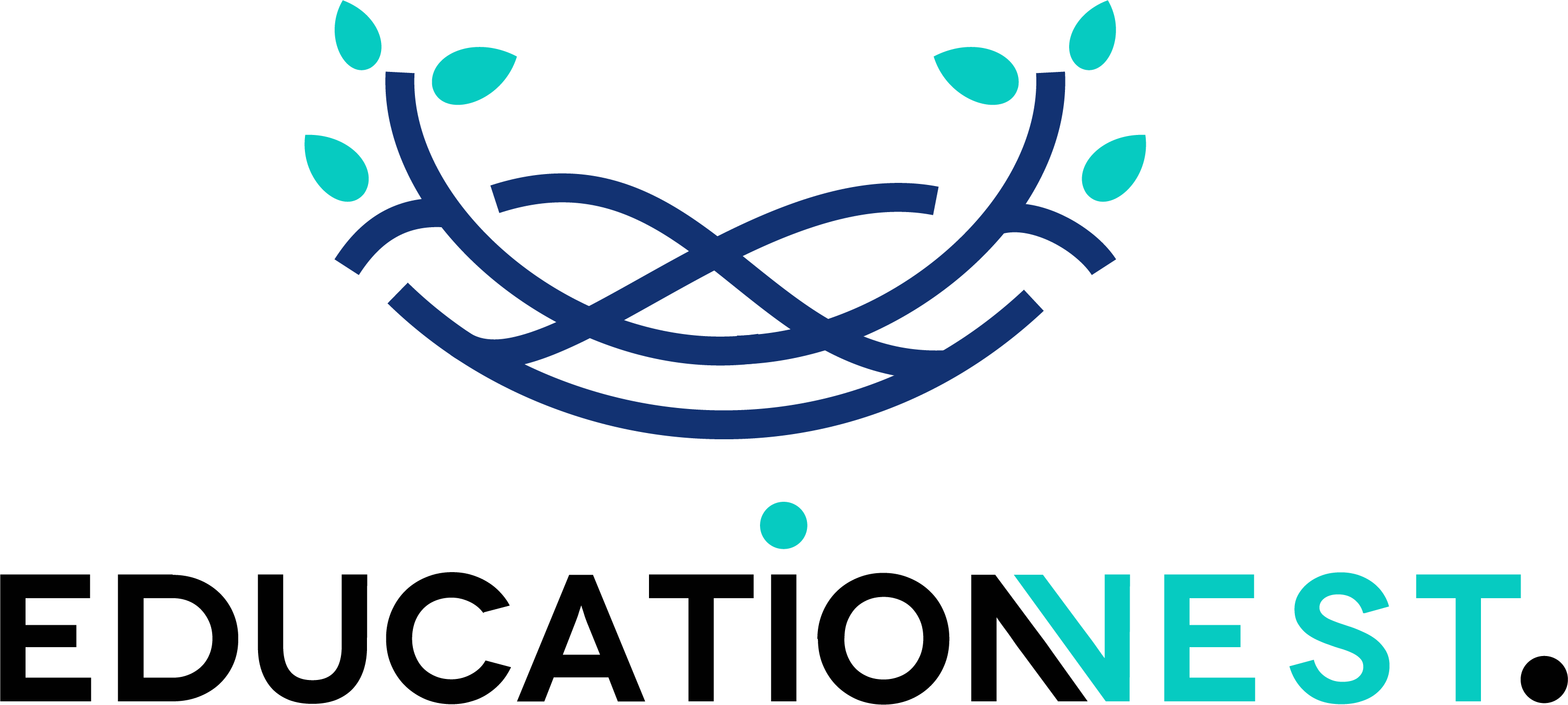
MBA Project Topics in Finance: A Comprehensive List
- Management , Project
- April 9, 2024
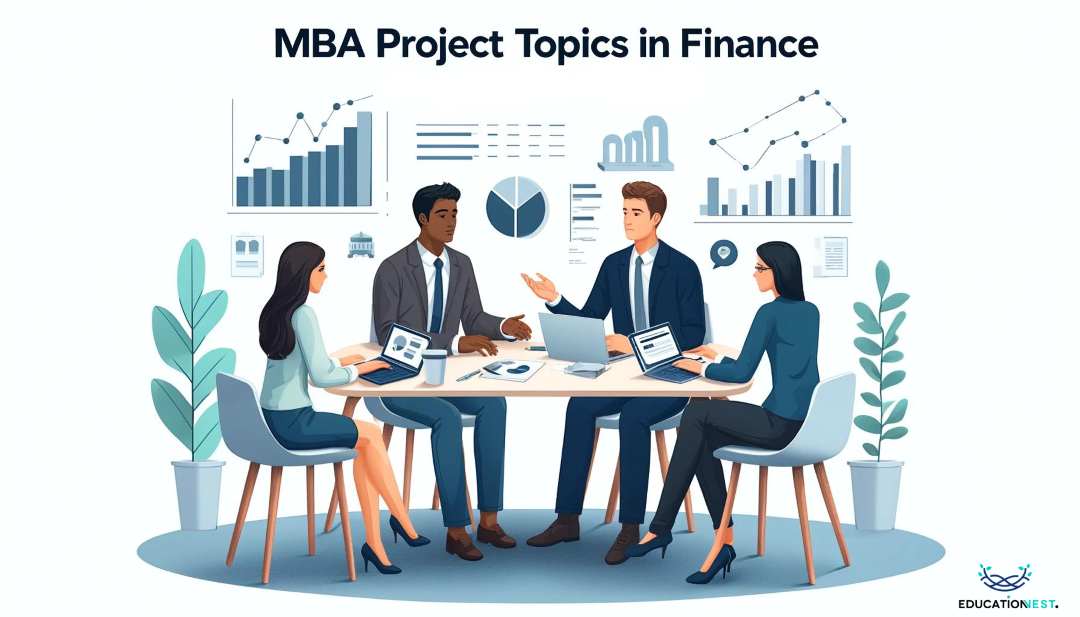
MBA project topics in finance are critical for students aiming to make a significant impact in their professional finance careers. Whether you are looking into the top 10 MBA finance project topics or browsing through a comprehensive list of project topics in finance , you will find a variety of subjects tailored to meet diverse academic and industry needs. This blog post dives deep into the relevance of MBA project topics in finance , especially focusing on the banking sector. Such topics are not only academically rigorous but also incredibly pertinent to real-world financial scenarios. If you’re looking to enhance your knowledge and boost your career, focusing on MBA project topics in finance in the banking sector can provide practical insights into financial operations and trends.
Importance of MBA Project Topics in Finance
Choosing the right MBA project topics in finance is very important. It shapes your learning and sets the foundation for your future career in finance. Good topics help you understand complex financial theories and apply them to real-world situations. This experience is valuable because it makes you ready for the challenges you will face in the financial world.
Additionally, working on these topics allows you to explore new areas and technologies, like financial technology or global financial strategies. This exploration broadens your knowledge and skills, making you more versatile and attractive to employers.
Moreover, through these projects, you develop critical skills such as problem-solving, analytical thinking, and effective communication. These skills are crucial not only in finance but also in any professional setting. For instance, when you analyze a financial model or evaluate investment risks, you learn to make informed decisions. This decision-making ability is highly valued in the finance industry.
Finally, completing an MBA project in finance can open doors to exciting career opportunities. It can lead to roles in areas like investment banking, risk management, or strategic planning. So, choosing and working diligently on your finance project topics can really boost your career prospects and prepare you for success.
Exploring the Top 10 MBA Project Topics in Finance
Here’s an insight into each of the top 10 MBA finance project topics, discussing their significance and how they prepare students for the financial industry:
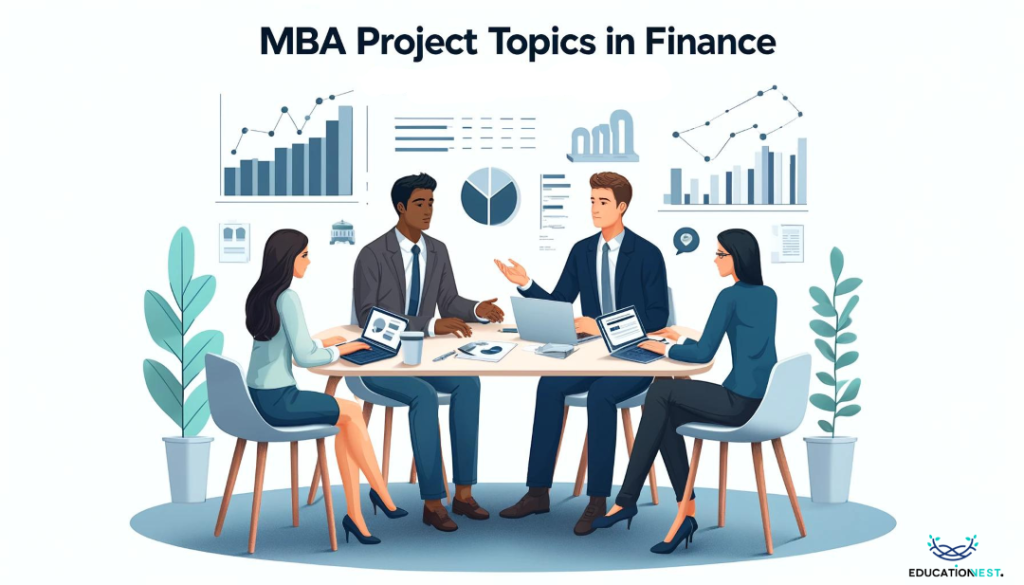
Market Analysis and Its Impact on Corporate Investment Decisions
Understanding market dynamics is crucial for making informed investment decisions. This topic explores how market analysis helps predict market trends and consumer behavior, which in turn influences corporate investment strategies. Students will learn to evaluate various market conditions and their potential impacts on investment opportunities.
Strategic Risk Management in Finance
This topic teaches MBA students how to identify potential risks and develop strategies to mitigate them. It focuses on the tools and techniques for effective risk management, essential for the stability and profitability of any financial institution.
Financial Strategies for Sustainable Growth
Sustainable growth is a goal for every company. This topic discusses financial planning and management strategies that help businesses grow while maintaining financial health. It includes analyzing financial statements, budgeting, and forecasting future financial needs.
Investment Strategies in Emerging Markets
Emerging markets offer unique opportunities and challenges. This topic covers the assessment of political, economic, and cultural factors that affect investments in these markets. Students will learn how to strategize investments to maximize returns while minimizing risks.
Corporate Finance and Its Role in Strategic Planning
Corporate finance is integral to strategic planning. This topic delves into financial decision-making processes, capital structure, and funding sources. Students explore how financial planning supports broader business strategies and objectives.
Behavioral Finance and Its Effects on Market Outcomes
Behavioral finance examines how psychological influences and biases affect the financial behaviors of individuals and markets. This topic is vital for understanding market anomalies and enhancing financial decision-making.
Financial Modeling and Decision Making
Financial modeling is a pivotal skill in finance. This topic teaches students how to construct and use advanced financial models for project evaluation, investment analysis, and decision making. It covers various modeling techniques, including sensitivity and scenario analysis.
Innovations in Financial Technology and Their Impact on Traditional Banking
Financial technology has revolutionized banking and finance. This topic explores the latest fintech innovations, such as blockchain, cryptocurrencies, and digital payments, and their implications for traditional banking systems.
Global Financial Crises and Their Management
Understanding financial crises and their management is crucial for any finance professional. This topic reviews historical financial crises to identify causes, impacts, and effective management strategies to mitigate future crises.
Ethics in Finance
Ethical practices in finance are more important than ever. This topic discusses the role of ethics in finance, including corporate responsibility, transparency, and the impact of unethical behavior on businesses and society.
Also Read: MBA Case Studies: How to Solve Effectively
MBA Project Topics in Finance in the Banking Sector
The banking sector is a fertile ground for diverse and impactful project topics. Here are some suggestions:
Credit Risk Management in Banks
This topic focuses on how banks assess, manage, and mitigate credit risks. It includes studying different risk models and their effectiveness in predicting default.
Investment Banking Trends
This topic examines the current landscape and future trends in investment banking. It covers areas such as mergers and acquisitions, equity offerings, and bond issuances.
Bank Performance Analysis
Analyzing a bank’s performance involves looking at financial ratios, profitability, and efficiency metrics. This topic helps students understand what drives bank performance and how it can be improved.
Regulatory Impact on Banking Operations
This topic addresses how regulations affect banking operations, including compliance challenges and strategies for maintaining regulatory adherence without compromising business growth.
Each of these topics not only deepens your understanding of finance but also prepares you for a dynamic career in the field. By selecting any of these MBA project topics in finance, you position yourself for academic success and professional advancement.
In conclusion, selecting the right MBA project topics in finance is crucial for your success as a student and as a future finance professional. These topics not only deepen your understanding of financial concepts but also help you apply this knowledge practically. By tackling these projects, you develop essential skills like critical thinking and problem-solving, which are invaluable in the finance industry.
Furthermore, these projects can set you apart in the job market, making you a desirable candidate for many high-level positions in finance. They show potential employers that you can handle complex financial tasks and drive results. So, take your time to choose a project that challenges you and aligns with your career goals. This decision can truly shape your future in finance.
Digital Marketing Salary in India in 2024
Software performance tools: a list of the best, popular posts.

The Job of a Product Manager: Overwhelming or Stressful?
- 01 March 2023
Splunk 101: A Beginner’s Guide to Harnessing Its Power
- 23 February 2023
Your Ultimate Guide to SQL Interview Questions and Answers
- 02 February 2023
Explore Topics
- Accounting and Finance (2)
- Artificial Intelligence (29)
- Big Data Analysis (13)
- Careers (3)
- Celebration (12)
- Certification (23)
- Cloud Computing (25)
- Coding (55)
- Corporate Training (3)
- Course (20)
- Creative Writing (2)
- Cryptocurrency (4)
- Culture (5)
- Cyber Security (30)
- Data Analysis (34)
- Data Science (35)
- Digital Marketing (28)
- Enterprise Training (1)
- Finance (2)
- Guide (140)
- Inspiration (26)
- Interview Questions and Answers (70)
- Learning (6)
- Lifestyle (8)
- Management (27)
- Monitoring and Evaluation (1)
- Politic (1)
- Project (6)
- Project Management (10)
- Question Bank (6)
- Robotic Process Automation (2)
- Salesforce (5)
- Skills (28)
- Tableau (3)
- Technology (22)
- Top Certifications (11)
- Trending (43)
- Uncategorized (10)
- Web Development (5)
Press ESC to close

- What is an MBA Capstone Project?
B-School Search
For the 2023-2024 academic year, we have 118 schools in our BSchools.org database and those that advertise with us are labeled “sponsor”. When you click on a sponsoring school or program, or fill out a form to request information from a sponsoring school, we may earn a commission. View our advertising disclosure for more details.
An MBA capstone project is the final step in many MBA programs. It’s here that MBA students put all that they’ve learned into practice by analyzing a meaningful and strategic business question. Often, this involves hands-on work within an existing company, but not always: MBA capstone projects can take the form of startup business plans and business simulations, too.
No matter their format or focus, each capstone project will likely be the most intensive and rewarding feature of an MBA candidate’s journey.
A capstone project is not the same as a thesis project, although they do share some qualities. Thesis projects are focused on theory and research and are based on the situations one would face in academia. Often taking the form of a large research paper, thesis projects can last the entire final year of an academic program, and some students may even begin before that, with the ultimate goal of contributing new knowledge to the canon of business research.
MBA capstone projects, by contrast, are more practical and similar to situations one would face in the business world. Here, students work in teams to answer strategic business questions. MBA capstones are hands-on immersions with real-world consequences, and they can have a major impact on an MBA graduate’s program experience and career.
Read on to see some examples of MBA capstone projects and get a walkthrough of the general process.
Stages of an MBA Capstone Project
Most MBA capstone projects occur during a program’s final year and can last anywhere from four weeks to a full semester. They often include some form of instruction (whether through prerequisite courses or scheduled advising) and practical application.
While MBA capstone programs will vary in format from program to program, they generally include the following stages:
- Topic Selection
- Preliminary Research
- Project Execution
- Written Report
- Final Presentation
It’s not necessarily over after the final presentation, either: some capstone projects carry over beyond the MBA program, leading to successful startup businesses, offers of employment, or investment opportunities.
Choosing a Capstone Topic
Many MBA programs provide some structured options for choosing a capstone topic. This can mean students are allowed to select from a list of possible partnership opportunities; it can also mean that faculty advisors will work with students to find a topic that meets the student’s strengths, weaknesses, and goals. But in other programs, MBA students are more free to choose their topic and their partner organization.
In their capstone project, MBA students should select a topic where they can answer a meaningful and strategic business question: one that’s complex enough to warrant significant time and energy, but also realistic enough to be achievable. These are not theoretical questions; each is tailored to a specific real-world business.
Some examples of MBA capstone topics include:
- What are the short-term outcomes of a mutual fund’s impact-investing initiative?
- How do multinational companies’ diversity and inclusion efforts adapt to non-Western office environments?
- What is the market feasibility of a startup’s application in target demographics?
- How can a recently downsized organization recover employee morale while balancing the budget?
The capstone topic must be specifically relevant to the partner company or organization. To this end, MBA students should heavily research the company’s strengths, weaknesses, and objectives before selecting their topic.
Similarly, MBA students should also turn that lens on themselves: what problems do they want to explore in their business careers, what causes do they find interesting, and how can their unique skill set be best put to use?
How an MBA Capstone is Graded
Some programs provide MBA candidates with a rubric for how their capstone will be graded, while others do not. Most capstones are graded through their ability to demonstrate key business skills (theoretical, practical, applied, and reflective) across functional areas (finance, human resources, marketing, and operations).
The final presentation is also a factor, as this is where the candidate demonstrates what they learned, or didn’t, through the course of the capstone.
An MBA candidate will rarely fail their capstone project. After all, they’ve made it through practically an entire MBA program up until then. Even if the project is a failure from a business point of view, an MBA candidate will likely still be able to effectively analyze where and why the project failed, and what lessons can be learned from that failure going forward.
Examples of MBA Capstone Projects
Ucla anderson school of management capstone project.
The MBA program at UCLA Anderson School of Management offers three capstone options: the Global Access Program (GAP), the Business Creation Project (BCP), and Anderson Student Asset Management (ASAM).
In the GAP, students partner with high-growth global companies in a market-entry consulting project. Working in five- to six-person teams, students bid on partnership opportunities, perform five to six months of research, then travel internationally to the partner organization. Combining interviews, meetings, and research, the students develop effective strategic business plans to advance the organization’s growth and present it to the organization’s executives, potential investors, and industry professionals.
Along the way, students are advised by faculty members who have directed, invested in, and provided consulting services to leading companies worldwide. In the last 20 years, over 3,000 students have completed the GAP, impacting 738 companies across 23 countries.
For students with an entrepreneurship focus, the BCP offers them the chance to launch a company. Students will work in teams across two academic quarters after taking two prerequisite courses to prepare their business plans. Through extensive research, development, and implementation, students will put strategies for every aspect of their business into practice. In three years, the BCO has had 47 teams and launched 24 companies.
The ASAM program is for current and aspiring quants who want experience as successful long-term portfolio managers. Guided by a faculty advisor and oversight committee, students in the ASAM program will select an optimal mix of equity, fixed income, and cash investments. Each four-member team manages approximately $200,000. Students will rotate work roles between that of an executive board member, strategy lead, risk manager, and programmer.
Carnegie Mellon University Tepper School of Business Capstone Project
The MBA program at Carnegie Mellon University Tepper School of Business offers students two different forms of capstone program: Strategic Management of the Enterprise and Management Game.
The Strategic Management of the Enterprise capstone is an experiential learning course where students are matched with one of several consulting projects to solve business problems partner companies face. This is a more traditional capstone program, focused on the practical application of business skills learned through the MBA curriculum. Past clients have included Walmart, P&G, and Ameriprise.
Tepper’s Management Game capstone is an applied management experience. Student teams run a computer-simulated multinational manufacturing company for three years, acting as its executive committee. Taking place at the end of the MBA program’s curriculum, the Management Game capstone focuses on the unstructured nature of business problems and prods students to use all the functional skills they’ve learned so far. External-facing exercises include interaction with industry partners and are related to each student’s career choices.
Uniquely, the Management Game capstone is graded by external professionals on the merit of the results students deliver; students can receive direct feedback from corporate partners throughout the process.
University of Dallas Satish & Yasmin Gupta College of Business Capstone Consulting Experience
The capstone consulting experience in the MBA program at the University of Dallas allows students to solve a strategic problem an organization faces. Since it was launched in 1973 as one of the first student consulting and research programs in the U.S., this capstone consulting experience has prepared graduates to consult with business leaders. MBA students in this capstone consulting experience have completed over 900 projects for over 500 companies including Fortune 1000 firms, entrepreneurial ventures, and nonprofit organizations.
Under the guidance of faculty members, students participate on a team assigned to work with a real organization on a 12-week comprehensive project. Every team will work together to provide actionable recommendations, including a proposal, industry/market research, a presentation, and recommendations in the form of a report.
Matt Zbrog is a writer and researcher from Southern California. Since 2018, he’s written extensively about how new and aspiring business school students can best plan their education and careers. In the Two Views series, he conducts detailed interviews with recent business school alumni, with a particular focus on the choice between in-person, online, and hybrid learning models. His Femme-BA series highlights business schools that not only excel academically but also take unique and robust steps to support a diverse and inclusive learning environment for women.
Related Programs
- 1 AACSB-Accredited Online MBA Programs 1">
- 2 ACBSP-Accredited Online MBA Programs 1">
- 3 Flexible MBA Programs 1">
- 4 IACBE-Accredited Online MBA Programs 1">
- 5 MBA in General Management 1">
- 6 One-Year Online MBA Programs 1">
- 7 Online Dual-Degree MBA Programs 1">
Related FAQs
- 1 Do Online MBA Programs Require Residency or Campus Visitation?
- 2 How Do I Get into Business School?
- 3 How Do I Secure an MBA Internship?
- 4 How Long Does it Take to Complete an MBA Program?
- 5 How Many Credits Do Online MBA Programs Require?
- 6 Is Attending Business School Worth It?
- 7 What Can I Do with an MBA Degree?
Related Posts
Online mba programs ranked by affordability (2023-2024).
These online programs ranked by affordability can be a viable alternative to more expensive programs while still receiving an excellent education and providing the flexibility working professionals need to balance work, family, and higher education demands.
The Push to Reopen Business Schools – The Covid-19 Revolt MBA Students May Soon Regret
When the Kellogg School of Management at Northwestern University decided to defend against Covid-19 in February 2021 by limiting classes with an in-person or hybrid in-person/remote configuration to only 16 percent of the courses offered by the school, MBA students swiftly and vigorously pushed back.
UNC’s Kenan-Flagler: Two Views, One Business School
In the nascent years of online MBA programs, there was a clear hierarchy: on-campus programs were considered the premier option, while online programs were considered second-rate. That hierarchy doesn’t exist anymore.
The New Harvard Business School Online and the Future of Education
Dr. Joshua Kim, the director of digital learning initiatives at Dartmouth College’s Center for the Advancement of Learning (DCAL), wrote “the rebranding of HBX to Harvard Business School Online is a signal that online education has well and truly arrived. For those of us in the online education game, Harvard Business School rebranding to embrace online is a great development.”
Femme-BAs: How the Foster School of Business Wins with Women
Many business schools still have demographics in the student body and faculty that seem pulled from the previous century. In Foster’s eyes, however, the concepts of diversity and inclusion aren’t a sidebar but rather they’re core tenets of what it means to be an innovative and contemporary business school.
Why Older Professionals Enroll in MBA Programs
In some cases, age comes with benefits. And when applying for an MBA program, work experience matters a lot. Acceptance rates at top business schools can be higher for older professionals.
Femme-BAs: How Rutgers Business School Wins with Women
Experts agree that moving toward gender equality is not only the right thing to do but it’s the smart thing to do. So shouldn’t MBA programs—where women frequently make up less than 38 percent of the student body—be focused on achieving it?
- Screen Reader
- Skip to main content
- Text Size A
- Language: English
Case Studies
- EXIM Procedure
Media & Events
- Image Gallery
- Media Coverage
Other Links
- GI of India
- Experience India
- Indian Trend Fair 2022
India Organic Biofach 2022
Gulfood dubai 2023, indian e-commerce industry analysis, the education market in india is expected to reach us$ 225 billion by fy25., advantage india, robust demand.
* India has the largest population in the world in the age bracket of 5-24 years with 580 million people, presenting a huge opportunity in the education sector.
* India has over 250 million school going students, more than any other country.
* The Study In India (SII) program aims to target more than half a million foreign students for higher education in India by 2047
Competitive Advantage
* Large English-speaking population allows easy delivery of educational products. India was ranked 52nd out of 111 countries in the English Proficiency Index 2022.
* Nine Indian institutes - the Indian Institute of Science (IISc) in Bengaluru and eight Indian Institutes of Technology (IITs) - were among the top 500 universities in the QS World University Rankings 2023.
Policy support
* 100% FDI (automatic route) is allowed in the education sector in India.
* The Government of India has taken initiatives like National Accreditation Regulatory Authority Bill for Higher Educational and the Foreign Educational Institutions Bill.
Increasing Investments
* The education market in India is expected to amount to US$ 225 billion by FY25.
* From April 2000-December 2023, Foreign Direct Investment (FDI) equity inflow in the education sector stood at US$ 9.49 billion.
* Indian edtech startups have received total investment of US$ 3.94 billion across 155 deals in FY22.
* In June 2022, edtech platform PhysicsWallah became India’s 101st unicorn by raising US$ 100 million in a Series-A funding round from WestBridge Capital and GSV Ventures, valuing the company at US$ 1.1 billion.
Education Industry Report
India occupies a significant position in the global education sector. One of the world's largest networks of institutions of higher learning is found in India. With ~26% of India’s population in the age group of 0-14 years, India’s education sector provides numerous opportunities for growth.
The number of colleges in India reached 50,734 in FY24 (as of March 4, 2024), up from 45,473 in FY22. The number of universities in India reached 1,265 in FY24 (as of March 4, 2024), up from 1,014 in FY22.
India had 43.3 million students enrolled in higher education in 2021-22 with 22.6 million male and 20.7 million female students, as against 41.3 million students enrolled in higher education in 2020-21, with 21.2 million male and 20.1 million female students. In FY22, Gross Enrolment Ratio (GER) in Indian higher education was 28.4%.
The education sector in India was estimated to be worth US$ 117 billion in FY20 and is expected to reach US$ 225 billion by FY25. The Indian edtech market size is expected to reach US$ 30 billion by 2031, from US$ 700-800 million in 2021.
The online education sector in India is growing rapidly, with growth of US$ 2.28 billion expected during 2021-2025, at a CAGR of almost 20%. Higher education institutes in India are focusing on creating online programmes due to the increasing demand from consumers.
From April 2000-December 2023, Foreign Direct Investment (FDI) equity inflow in the education sector stood at US$ 9.49 billion, according to the data released by the Department for Promotion of Industry and Internal Trade (DPIIT).
India’s large English-speaking population allows easy delivery of educational products. India was ranked 48 th out of 112 countries in the English Proficiency Index 2021. Nine Indian institutes - the Indian Institute of Science (IISc) in Bengaluru and eight Indian Institutes of Technology (IITs) - were among the top 500 universities in the QS World University Rankings 2023. A total of 100 Indian institutions have been qualified for the Times Higher Education World University Rankings 2023, with the Indian Institute of Science in Bengaluru being the highest-ranked.
Indian edtech startups have received total investment of US$ 3.94 billion across 155 deals in FY22.
Growth-stage funding rounds accounted for about 60% of the deals in EdTech space in terms of deal count, with an average ticket size of US$ 10 million in H1 CY23. In H2 CY22, Bjyus and UpGrad each raised a substantial sum of money—more than US$ 200 million.
Amazon launched its global computer science education initiative in India. The aim of this initiative was to offer one lakh students the opportunity to study computer science. Amazon India also launched the second edition of Machine Learning (ML) Summer School, with the aim to provide students the opportunity to learn important ML technologies from Amazon scientists, making them ready for careers in science.
To liberalise the sector, the Government has taken initiatives such as the National Accreditation Regulatory Authority Bill for Higher Educational and the Foreign Educational Institutions Bill. The government schemes of Revitalising Infrastructure and System in Education (RISE) and Education Quality Upgradation and Inclusion Programme (EQUIP) are helping the government tackle the prominent challenges faced by the education sector.
The National Education Policy (NEP), which will be fully implemented over the course of this decade starting from 2021-22, will have a strong focus on high-quality vocational education. Under the National Education Policy 2021, the government will set up regional and national institutes for virology, >15,000 schools, 100 new Sainik schools, and 750 Eklavya model residential schools in tribal areas.
In August 2023, Union Minister of Education Mr. Dharmendra Pradhan unveiled the National Curriculum Framework for School Education (NCF), which has been developed based on the National Education Policy (NEP), 2020 vision. As per that, in order to guarantee that students have adequate time and opportunity to perform successfully, board exams will be offered at least twice a year.
The Central Government approved the “New India Literacy Programme” for the period FY22-27 to cover all the aspects of adult education to align with the National Education Policy 2020 and Budget Announcements 2022-23.
The National Commission for Women started a country-wide capacity-building and personality development programme for women undergraduate and postgraduate students in an effort to make them more independent and job-ready. The commission will partner with central and state institutions to prepare women students for the job market by providing sessions on personal capacity building, professional career skills, digital literacy and effective use of social media.
STEM-based edtech companies have been partnering with Niti Aayog and the government to build a STEM ecosystem by establishing Atal Tinkering Labs (ATL) to spread knowledge about STEM, STEAM, AI, ML, and robotics for K-12 students.
In December 2023, UNICEF and its global partnerships platform Generation Unlimited (also known as YuWaah in India) partnered with key organisations committed to working towards a green future for children and young people as a part of the Green Rising India Alliance.
In September 2023, the government launched the Skill India Digital (SID) platform to make skill development more innovative, accessible and personalised with a focus on digital technology and Industry 4.0 skills.
In September 2023, a three-year partnership called "Education to Entrepreneurship: Empowering a Generation of Students, Educators, and Entrepreneurs" was launched by the Ministry of Education the Ministry of Skill Development and Entrepreneurship, and Meta in New Delhi.
Prime Minister Mr. Narendra Modi, in July 2023, laid the foundation stone for three new buildings at Delhi University — the faculty of technology, a computer centre, and an academic block.
The education sector has seen a host of reforms and improved financial outlays in recent years that could possibly transform the country into a knowledge haven. With human resources increasingly gaining significance in the overall development of the country, the development of the country’s education infrastructure is expected to remain the key focus in the current decade. In this scenario, infrastructure investment in the education sector is likely to see a considerable increase.
Related News
The median salary for founders of Indian unicorn companies rose to US$ 1,79,662 (Rs. 1.5 crore), with female founders earning a median of US$ 1,19,774 (Rs. 1 crore) and male founders earning a median of US$ 2,15,594 (Rs. 1.8 crore).
Ind-Ra upholds a positive view for the education sector in FY25, foreseeing enrolment growth and tuition fees driving infrastructure investments amidst rising demand.
Indian universities lead a patent surge, filing 23% of patents in FY23, driven by awareness campaigns and dominance in computer science filings.
More Indian students than Americans took the GRE in 2022-23, reflecting changing educational trends.
Prime Minister, Mr. Narendra Modi reaffirms commitment to internationalize Indian education through NEP goals, citing IIT global campuses as key initiatives.
Top Indian cities for Education

Industry Contacts
- University Grants Commission (UGC)
- All India Council of Technical Edcuation(AICTE)

Education Sector India
Ibef campaigns.

APEDA India Pavilion Gulfood February 20th-26th, 2022 | World Trade Centre,...

Ibef Organic Indian Pavilion BIOFACH2022 July 26th-29th, 2022 | Nuremberg, ...
Spiritual Tourism in India: Analysing Economic Impact and Growth Potential
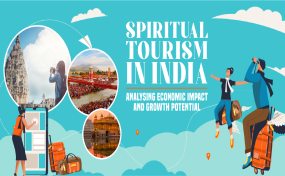
India, the country where millions of travellers come to seek spiritual fulfilment as part of their tourism journey, makes it an integral part of India...
Financial Resurgence: A Comprehensive Exploration of the Recent Boom in Mutual Fund Investments in India

Mutual funds play an indispensable role in capital markets, serving as a gateway for individuals and institutions to access a diverse range of securit...
Transforming India's Logistics Sector: Challenges and Opportunities

The logistics industry plays a vital role in the dynamic economic landscape of India by enabling the efficient movement of goods and services througho...

Digital India: Advancements in E-Governance Services
Digital India was launched in India in 2015 with the aim of transitioning I...

Air Travel Trends: India's Rising Importance in the Global Passenger Market
The Indian aviation sector has been experiencing great growth over the past...
Transforming the Toll Payment Infrastructure in India
India's booming roads and cars are paving the way for smart traffic man...

Not a member
How to Choose a Project Management MBA and Why
Project managers ensure that high-priority work assignments are done well and finished quickly.
Key Facts About Project Management MBAs

Getty Images
Professors and practitioners of project management describe it as the art and science of converting big ideas into concrete results.
A person who takes pride in his or her organizational and people skills may enjoy a career as a project manager, a business professional who often oversees major corporate initiatives and complex group assignments.
Why an MBA Is Useful During COVID-19
Ilana Kowarski Aug. 24, 2020

One way to prepare for this type of career is to earn an MBA degree. Some business schools offer an MBA specialization in project management, which may appeal to an aspiring project manager.
What Project Management Is
Project management, experts say, is a type of management that focuses more on action than theory. The primary objective is to ensure that dreams come true and hopes are realized. It requires the ability to come up with and implement smart procedures for workers to follow as they collaborate on tasks, and it necessitates strategic thinking about how an organization can accomplish its mission.
The field also demands diplomacy, since project managers may need to peacefully resolve conflicts between team members who disagree. Project managers may be responsible for coordinating negotiations between factions within a team. The ability to inspire coworkers to overcome formidable challenges is also a plus in this profession, as is the courage to confront people about problems with work product, according to individuals working in the field.
"Project management, in layman’s terms, is making things happen," Sergei Brovkin, the founder and principal of Collectiver Inc. – a Canadian-based consulting firm – wrote in an email.
"Project management is a methodology and a set of tools that helps (with) creating value more efficiently," says Brovkin, who earned a Master of Business Administration, or MBA, degree from McGill University in Canada and has project management professional certification. "Hence, almost any delivery may be set up as a project – and there will be a project manager to run it, regardless of the industry or the preferred vocabulary."
Adam Lange, a senior adjunct professor with Medaille College in New York who oversees the school's project management MBA concentration , says that nearly any aspiring manager could benefit from training in project management because it provides key implementation skills.
"Every manager, for the most part, will do project management as part of their role," says Lange, who earned his MBA at Medaille.
Who Should Get a Project Management MBA Degree
Vanja Djuric, an associate professor of practice in the marketing department at the University of Akron College of Business Administration in Ohio where she is also a director of research and analytics, says that anyone whose dream is to become a C-suite executive should consider an MBA in project management. A project manager serves as a "liaison between the team and the higher management and/or client," she wrote in an email, adding that this type of business professional is prevalent in the information technology industry.
"Project managers are responsible for leading the entire project through all of its steps – from planning and execution to completion," says Djuric, who earned an MBA from Kent State University in Ohio, a Master of Science in Management degree focusing on information systems from the University of Akron and a Doctor of Business Administration degree from the University of Liverpool in the U.K.
A job as a project manager demands a detail-oriented, level-headed, practical and methodical approach, according to people who have this type of position, so it is a profession that is especially suitable for someone interested in logistics and strategy. Project managers say precision is highly valued in their field, so it may be a good fit for a person who embodies orderliness and is zealous about meeting exacting standards.
What Project Managers Do And Why It Matters
Project managers often play a pivotal role in the organizations where they work and some exceptional ones rise to senior executive roles, with a few becoming chief operating officers or chief executive officers, according to individuals who work in these jobs. The work of a project manager has the potential to have a tremendous positive influence on the bottom line of a for-profit corporation, and they tend to regularly interact with and be observed by high-level executives, which means that project managers are often first in line for coveted promotions, project managers say.
Lange notes that senior project managers sometimes lead high-stakes, multimillion-dollar initiatives, often doing work that is essential for the function and survival of their employer. He suggests that solid communication abilities are vital to project management roles, since these jobs require consistent, clear and constant communication with others.
"You have to be somebody who is very comfortable with responsibility, because as you move along in your career, you are going to have progressively more," Lange says. At the beginning of his career he led projects that were typically worth between $10,000 and $100,000, but now he estimates that he oversees an $80-million portfolio of projects.
Salary statistics reveal that project management is a high-paying field that often leads to a six-figure salary. According to the Project Management Institute's 11th edition of its salary survey , the median annual salary among U.S. project managers is $116,000. The U.S. is a country where project managers are paid especially well: The only country where they are paid better is Switzerland, according to the survey.
How to Select a Project Management MBA Program
Professional project managers who have MBA degrees suggest that B-school hopefuls look for a school that provides excellent coursework in a variety of academic areas that are relevant to project management positions, including strategy, finance, accounting, operations and human resources. They note that effective project management requires someone to understand why their project matters and how it influences the success of the organization they work for, which means that they need to know about multiple aspects of business.
Jonathan Friedman, founder and CEO of TrueNxus - a project management software company, says MBA applicants with an interest in project management should look for a school that offers a broad curriculum and excels at teaching general management principles.
Friedman, who earned an MBA at the University of Chicago Booth School of Business , says "well-roundedness" and an ability to think critically are essential to the project management field, as is the ability to speak the language of experts in various technical business disciplines.
Some experts suggest that business schools which do not offer a formal concentration or specialization in project management may still provide solid preparation for the profession. They explain that it is possible to become a project manager after receiving an MBA degree even if the phrase "project management" isn't attached to the degree. However, other experts point out that an MBA concentration or specialization in project management can give MBA grads an edge when competing for project management jobs.
Aspiring project managers who plan to attend graduate business school can elect to supplement their business degree with a certification in project management, although professional project managers have varying opinions about the importance and value of certification. Expertise in certain popular project management methodologies like Agile, Waterfall and Lean is helpful within this career path, according to experts on the field.
"Increasingly, organizations are also interested in project management programs that include the skills and ability to conduct a Social Impact Analysis," wrote Russell Darnall, a leading faculty member in the M.S. in Project Management program at Walden University – an online academic institution – who also has a doctorate in management and a master's degree in project management.
"A Social Impact Analysis provides a mechanism for the project manager to assure that the environment, social and economic impact of their project is consistent with the Corporate Social Responsibility goals of the organization," Darnall explained in an email. "Project managers are also required to understand their project’s impact on sustainability, including people, profit and planet, and manage their project to minimize negative outcomes and maximize positive ones."
Experts recommend seeking out project management programs that allow students to work on real-world business projects.
"Hiring managers look for battle-tested individuals who have faced and overcome the typical and unforeseen challenges that all projects face," wrote Brian LeBlanc, a professor of practice at the Clark University School of Professional Studies in Massachusetts.
"A program that successfully prepares students for this eventuality will provide relevant application of the principles being learned; it will focus on building communication skills, strategic thinking and accountability, not just 'right answers' for a quiz," explains LeBlanc, who has an MBA from Babson College's F. W. Olin Graduate School of Business in Massachusetts.
What Can You Do With an MBA in Project Management?
A project manager will often create the blueprints describing how an ambitious goal will be achieved and explaining how potential obstacles to that goal will be overcome, MBA faculty say. His or her specialty is figuring out how to execute a grand vision and navigate roadblocks that come up along the way, according to MBA faculty.
John Paul Engel, a lecturer in entrepreneurship with the University of Iowa John Pappajohn Entrepreneurial Center with significant project management work experience, says project management is a highly marketable skill that is valuable in nearly every type of organization. The extensive list of companies that hire project managers includes prestigious employers such as high-profile consulting firms and major government contractors, Engel says. Utility and energy companies can also benefit from the expertise of well-trained project managers, he adds.
"Having a strong background in project management and cultivating that among your team is extremely valuable," Engel says.
Explore the top five project management programs in the U.S. News 2021 Best Business Schools rankings.
Searching for a business school? Get our complete rankings of Best Business Schools.
Tags: MBAs , business school , education , graduate schools , students
You May Also Like
Ways women can thrive in b-school.
Anayat Durrani May 29, 2024

Study Away or Abroad in Law School
Gabriel Kuris May 28, 2024

A Guide to Executive MBA Degrees
Ilana Kowarski and Cole Claybourn May 24, 2024

How to Choose a Civil Rights Law School
Anayat Durrani May 22, 2024

Avoid Procrastinating in Medical School
Kathleen Franco, M.D., M.S. May 21, 2024

Good Law School Recommendation Letters
Gabriel Kuris May 20, 2024

Get Accepted to Multiple Top B-schools
Anayat Durrani May 16, 2024

Premeds and Emerging Medical Research
Zach Grimmett May 14, 2024

How to Get a Perfect Score on the LSAT
Gabriel Kuris May 13, 2024

Premeds Take 5 Public Health Courses
Rachel Rizal May 7, 2024


Online Students
For All Online Programs
International Students
On Campus, need or have Visa
Campus Students
For All Campus Programs

MBA in Project Management Online
Earn an MBA in Project Management
- $637/credit (30 credits total)
- Program accredited by ACBSP
- Complete in about 1 year
- No GRE/GMAT required
- Join an in-demand career field
- Meets educational requirement to sit for PMP ® exam
MBA in Project Management Program Overview
Meet the growing demand for project leaders and couple your MBA with a project management concentration with the Master of Business Administration in Project Management from Southern New Hampshire University. Learn what it takes to plan, monitor, measure and adapt a project from start to finish, and enroll in a rigorous MBA program that fits right into your life.
A project manager's job is to keep projects and people on track, and the field of project management is growing as more companies move to project team-based business models. Our MBA is all about understanding and optimizing the functions of a business. The project management MBA builds a strong foundation of management skills, and you can apply these skills to leadership roles across a variety of industries, including construction, healthcare, IT development, manufacturing and more.
Students in this program have the opportunity to take QSO-645: Project Management for PMP ® Certification, which upon successful completion awards them the 35 hours of project management education required to sit for the Project Management Professional ® (PMP) certification exam. It's important to note that instructors of this course have completed the PMI ® Authorized Training Partner Train the Trainer – PMP's exam prep program. This program equips SNHU faculty with the authority to deliver PMP exam prep and training content to PMI’s quality standards.
SNHU’s MBA in Project Management is one of the most affordable MBAs in the nation and can be completed in just over a year.
.st0{fill:#21386D;} What You'll Learn
- Quantitative & qualitative data analysis
- Adaptable strategy development
- Improvement techniques for organizations
- Strong leadership & collaboration approaches
- How to cultivate a globally aware team
.cls-1 { fill: #21386d; } How You'll Learn
At SNHU, you'll get support from day 1 to graduation and beyond. And with no set class times, 24/7 access to the online classroom and helpful learning resources along the way, you'll have everything you need to reach your goals.
Career Outlook
With an MBA in Project Management online from SNHU, you can develop the skills and experience you need to capitalize on the growing demand for qualified project managers.
PMI ® expects the number of project management jobs to skyrocket: It cites that the global economy will need 25 million new project professionals by 2030. 1 Earning potential for project management workers is also strong – particularly for workers with the PMP certification. A 2021 PMI survey found that PMP-certified workers earned 32% more than those without certification. 1
However, job growth and earning potential for project management careers will vary depending on the career you pursue with your project management MBA.
.cls-1 { fill: #21386d; } Job Growth
According to the U.S. Bureau of Labor Statistics, career opportunities for project management specialists are expected to grow 6% , construction managers are expected to increase 5% through 2032, while jobs for operations research analysts are projected to grow 23% . 2
.cls-1 { fill: #21386d; } Salary
In 2022, the median annual salary was $95,370 for project management specialists, $101,480 for construction managers and $85,720 for operations research analysts. 2
Understanding the Numbers When reviewing job growth and salary information, it’s important to remember that actual numbers can vary due to many different factors — like years of experience in the role, industry of employment, geographic location, worker skill and economic conditions. Cited projections do not guarantee actual salary or job growth.

The project management MBA offers a unique mix of project management skills and broad-based business knowledge that can help you stand out in this growing field.
“This degree will not only prepare you to carry a project management certification but it provides you the business acumen to put those project skills to work with any industry and any project model environment,” said Gina Cravedi '18 , SNHU’s director of student experience operations, an MBA graduate and certified Project Management Professional (PMP).
Where Could You Work?
Project management.
Oversee a project from start to finish to ensure its scope and goals remain on track throughout.
Risk Management
Analyze market and operational conditions prior to a project's start to create risk versus reward assessments for stakeholders.
Cost Estimation
Gather and analyze data to estimate the amount of time, money, materials and labor needed to keep a project on time and within budget.
Procurement
Quality control.
Maintain project quality from start to finish by monitoring performance/outcomes and identifying any needed areas of quality improvement.
Supply Chain Management
Satisfy deliverable demands by managing the effective movement of products, resources and people during each stage of the supply chain.
Not sure you want to work as a project manager? The skills gained in a project management MBA can help you develop key leadership and career skills that enhance any business management position.
Earning an MBA in Project Management gave Dara Edge '15 new tools to support her career. During her time as a social media community manager, Edge managed engagement on her employer's social media channels and worked with teams from across the organization to analyze community engagement data.
Edge said her MBA program helped develop the strong critical analysis and communication skills needed for this role.
Start Your Journey Toward an Online Project Management Degree
Why snhu for your mba in project management flexible with no set class meeting times, you can learn on your schedule and access online course materials 24/7. our online mba program offers more fluidity around assignment due dates than before and course resources better suited for the on-the-go learner. affordable as part of our mission to make higher education more accessible, we’re committed to keeping our tuition rates low. in fact, we offer some of the lowest online tuition rates in the nation. prior coursework and work experience could also help you save time and money. snhu’s mba transfer policy allows you to transfer up to 6 credits from your previous institution. you could also earn college credit for previous work experience . respected founded in 1932 , snhu is a private, nonprofit institution with over 160,000 graduates across the country. snhu is accredited by the new england commission of higher education (neche) — which means our 200+ associate, bachelor's and master's programs meet high academic standards. in addition, many of snhu's degree programs also carry specialized programmatic accreditation. this includes our portfolio of business programs, which are accredited by the accreditation council for business schools and programs (acbsp). to be regionally accredited , one of 7 regional accreditation organizations recognized by the council for higher education accreditation (chea) has determined that the university meets its high academic standards and expectations. most nonprofit institutions are institutionally accredited. in addition, snhu's suite of online business programs, including the mba, are also programmatically accredited by the accreditation council for business schools and programs (acbsp). in addition, snhu has been nationally recognized for its efforts to lead the way toward more innovative, affordable and achievable education: “most innovative” regional university honors from u.s. news & world report each year since 2015 a $1 million grant from google.org to explore soft skills assessments for high-need youth recognition as a 2017 digital learning innovator by the online learning consortium extensive business alumni network since our first mba graduate class in 1974, we’ve welcomed over 20,000 mba graduates to our alumni network. for current students, that means an extensive business networking group, an opportunity to seek out college mentorship opportunities and learn from students who have already walked the path. 93.2% of online students would recommend snhu according to a 2023 survey with 21,000+ respondents. discover why snhu may be right for you . admission requirements expanding access to quality higher education means removing the barriers that may stand between you and your degree. that’s why you can apply at any time and get a decision within days of submitting all required materials: completed free application undergraduate transcripts, which we can retrieve for you by submitting a transcript request form acceptance decisions are made on a rolling basis throughout the year for our 5 graduate terms . how to apply if you’re ready to apply, follow these simple steps to get the process going: complete free graduate application submit undergraduate transcripts work with an admission counselor to explore financial options and walk through application process if (typeof accordiongroup === "undefined") { window.accordiongroup = new accordion(); } accordiongroup.init(document.getelementbyid('9901249d5443462f86776fc7af5ff40c')); what snhu students are saying.

“You have the ability to use the degree in so many different ways — whether you want to work in the project management field, work in management, or if you want to learn how to manage projects in general. You’ll always be able to use the skills and knowledge that you’ll learn in the program.”
Courses & Curriculum
The MBA in Project Management online combines theory with practical application. You can graduate with a set of tools that complement today's tech-intensive workplace.
In the updated curriculum, you'll engage in scenario-based learning opportunities, allowing you to complete activities and individually graded group work based on solving real-world business problems. This type of learning offers hands-on learning experience in your online classroom that mimics real-world work settings and challenges.
Taught by professors with many years of business experience, your courses will focus on how to lead a project from start to finish – smoothly. You’ll learn how to define the scope of a project, develop a project timeline, and identify costs and resources.
Project management learning will be supported by the MBA core curriculum, which focuses on all aspects of business leadership, including:
- Building Business Leaders
- Applied Business Statistics
- Leading People and Organizations
- Optimizing Brands
- Leading Organizational Change
Your project management degree courses will focus on the tools, processes and strategies used to successfully hit the goals of any big project.
You’ll learn how factors like scope, time, cost, quality, risk, resources and communication impact a project. You can apply this learning to real-world case studies to gain key decision-making experience. And you’ll get hands-on practice using manual and technology-based tools to start, plan and control projects.
In SNHU's MBA program, you can take advantage of benefits like:
- Embedded credentials from external partners, which give you the option to enhance your learnings and overall marketability in the field. These include learning tools such as Power BI, MS Excel and Tableau, as well as enhancement of soft skills such as human intelligence and strategy implementation.
- Fluid learning paths, which offer more flexibility in due dates as well as learning across modules with interconnected themes to draw relationships between business principles.
- Group work, featuring collaborative work and discussions with classmates – with individual contributions and grades.
- Multimedia, including animations for complex topics, videos featuring industry leaders sharing business insights and video communication tools.
- Scenario-based learning, where you'll practice and problem-solve within real-world business scenarios – and your instructors act as mentors.
- Timely resources, featuring relevant resource material from leading professional organizations and publications.
If you’re interested in seeking the PMP certification, you have the option to take QSO-645: Project Management for PMP Certification as part of your MBA program. In this course, you'll explore the professional and social responsibilities of project management. You can also get a deeper understanding of the tools and techniques you can use to plan and manage projects.
This course satisfies the education requirement of 35 hours needed to take the PMP exam. It does not guarantee certification or passage of the certification exam, but does get you closer to earning this key credential. You must meet all other PMP requirements, including work experience hours, in order to sit for the exam.
No matter what your goals are, an MBA in Project Management offers key leadership and career skills you can use to be successful as a project manager or business leader. These skills include:
- Communication. Communicate effectively between internal team members, clients and vendors.
- Critical thinking. Know how to ask questions, solve problems and make decisions.
- Leadership. Be an active leader and coach for members of your project team to keep projects running smoothly.
- Organization. Plan and monitor project timelines to keep projects on track.
As an add-on to your degree with minimal additional courses required, MBA students can also pursue a graduate certificate beyond the standard degree program, including a project management graduate certificate . This allows you to list another significant credential on your resume with minimal additional coursework.
Don't have a business background? No problem. Our MBA is accessible to everyone. Interested students must have a conferred undergraduate degree for acceptance, but it can be in any field. Those without an undergraduate degree in business or a related field may be asked to complete up to 2 foundation courses to get started. These foundations cover essential business skill sets and can be used to satisfy elective requirements for the general-track MBA. With foundations, the maximum length of your online MBA would be 36 credits.
Attend full time or part time. Students in the MBA have the option to enroll full time (at 2 classes per term) or part time (with 1 class per term). Full-time students should be able to complete the program in about 1 year, while part-time students could finish in about 2 years. Our SNHU students are busy, often juggling jobs, family and other obligations, so you may want to work with your academic advisor to identify the course plan that works for you. The good news is, you can switch from full time to part time and back again as often as you want.
Minimum Hardware Requirements Component Type PC (Windows OS) Apple (Mac OS) Operating System Currently supported operating system from Microsoft. Currently supported operating system from Apple. Memory (RAM) 8GB or higher 8GB or higher Hard Drive 100GB or higher 100GB or higher Antivirus Software Required for campus students. Strongly recommended for online students. Required for campus students. Strongly recommended for online students. SNHU Purchase Programs Visit Dell Visit Apple Internet/ Bandwidth 5 Mbps Download, 1 Mbps Upload and less than 100 ms Latency 5 Mbps Download, 1 Mbps Upload and less than 100 ms Latency Notes: Laptop or desktop? Whichever you choose depends on your personal preference and work style, though laptops tend to offer more flexibility. Note: Chromebooks (Chrome OS) and iPads (iOS) do not meet the minimum requirements for coursework at SNHU. These offer limited functionality and do not work with some course technologies. They are not acceptable as the only device you use for coursework. While these devices are convenient and may be used for some course functions, they cannot be your primary device. SNHU does, however, have an affordable laptop option that it recommends: Dell Latitude 3301 with Windows 10. Office 365 Pro Plus is available free of charge to all SNHU students and faculty. The Office suite will remain free while you are a student at SNHU. Upon graduation you may convert to a paid subscription if you wish. Terms subject to change at Microsoft's discretion. Review system requirements for Microsoft 365 plans for business, education and government. Antivirus software: Check with your ISP as they may offer antivirus software free of charge to subscribers. if (typeof accordionGroup === "undefined") { window.accordionGroup = new accordion(); } accordionGroup.init(document.getElementById('f756dce5bd874c61855f6f6e92d88470')); Master of Business Administration (MBA) Technical Requirements Video Communication Platform: Mac or PC desktop or laptop (not a mobile device or tablet) Webcam Microphone Required: At least 1 Mbps upload/download speed Learn more about our detailed technical requirements Internet Connectivity for Virtual Labs: Recommended: 5Mbps upload/download speed with less than 40ms latency if (typeof accordionGroup === "undefined") { window.accordionGroup = new accordion(); } accordionGroup.init(document.getElementById('462a111590cd4b6f97481de9061c8aa1')); University Accreditation

Tuition & Fees
Tuition rates for SNHU's online degree programs are among the lowest in the nation. We offer a 25% tuition discount for U.S. service members, both full and part time, and the spouses of those on active duty.
Tuition rates are subject to change and are reviewed annually. *Note: students receiving this rate are not eligible for additional discounts.
Additional Costs: Course Materials ($ varies by course). Foundational courses may be required based on your undergraduate course history, which may result in additional cost.
Frequently Asked Questions
SNHU has provided additional information for programs that educationally prepare students for professional licensure or certification. Learn more about what that means for your program on our licensure and certification disclosure page .
The Project Management Professional (PMP) is a registered mark of the Project Management Institute, Inc.
The PMI Authorized Training Partner seal is a mark of the Project Management Institute, Inc.

- 250+ Best MBA Information Technology Project Topics IT
by charteredexpress | Last updated Oct 16, 2023 at 6:43PM | MBA , MBA Project Topics | 0 comments

250+ Best MBA Information Technology Project Topics
Written by charteredexpress.
- You May Also Like...
Submit a Comment Cancel reply
MBA Information Project Technology Topics. Hey there, dear reader! 🌟 So, you’ve clicked on a title that reads “250+ Best MBA Information Technology Project Topics”, huh? First off, give yourself a pat on the back. Why? Because you’re diving into a world that’s as fascinating as it is vast. Information Technology (or IT, as the cool kids call it) is not just about fancy gadgets and tangled webs of coding. It’s the backbone of our digital era. And meshing that with an MBA ? Well, that’s like adding a sprinkle of business magic over the tech realm.
Now, before we plunge into our ocean of topics (yes, there are over 250 of them!), let me set the stage for you. Imagine, if you will, a realm where the sleek, systematic world of business collides with the dynamic, ever-evolving universe of technology. That’s what an MBA in IT looks like. It’s not just about understanding how technologies work; it’s about leveraging them to drive businesses forward, to strategize, to innovate, and to lead in a digital-first world.
Also Read: MBA Finance Topics
The beauty of merging an MBA with IT is how relevant it is today. We live in a time where apps dictate our routines, where we trust algorithms to recommend our next favorite song, and where businesses pivot their strategies based on digital insights. Information Technology is not a mere department tucked away in the basement of a company; it’s at the boardroom table, making significant decisions.
Okay, let’s play a quick game. Close your eyes (well, metaphorically, because you need to read this!) and think of any big brand. Got one? Now, whether you thought of a tech giant like Apple or a coffee mogul like Starbucks, I bet they’ve got a robust IT strategy in place. That’s because, in today’s world, whether you’re selling smartphones or lattes, technology plays a pivotal role.
And this is where the magic of our blog post comes in. We aren’t just listing mundane, run-of-the-mill topics. Oh no! We’ve got the crème de la crème, the pick of the litter, the… okay, you get it! These topics are tailored for those who are eager to dip their toes in the vast MBA IT pool. Whether you’re a student searching for a compelling dissertation topic, an academician looking to guide your pupils, or a curious soul with a penchant for tech and business, there’s something here for everyone.
Also Read: MBA Jokes
Now, I promise we’re getting to our impressive list of 250+ topics soon. But it’s essential to grasp why these topics matter. Each one holds the potential to shape businesses, disrupt industries, and maybe (just maybe) revolutionize the digital landscape. As you scroll through, I encourage you to approach each topic with an open mind. Think of them as seeds. Some might resonate with you immediately, while others might need a bit of pondering before they sprout ideas.
Alright, enough of my rambling. You’re here for topics and topics you shall get! As we embark on this digital roller coaster ride, I hope you find that spark, that golden nugget of inspiration, amid our curated list. So, buckle up, tech aficionados! Let’s decode the future of business, one MBA IT topic at a time.
Ready? Set? Dive in! 🚀📚🔍
250+ Best MBA International Finance Project Topics
by charteredexpress | Last updated Oct 16, 2023 at 6:42PM
250+ Best MBA International Finance Project Topics Hey there, finance...
250+ Best MBA Business Analytics Project Topics
MBA Business Analytics Project Topics The Magic World of MBA Business...
Best Amity MBA Project Report 2500+ Completed
Amity MBA project. Discover Chartered Express: Affordable, superior-quality...
Top 10 Online MBA Colleges in India 2024- 2025
Hey there, reader! 😊 Guess what? If you're clicking on this blog, chances are,...
100+ Hilarious MBA Jokes, Memes
100+ Hilarious MBA Jokes, Memes. The world of business doesn't have to be all...
Recent Posts :

No 1 Best Thesis Writing Services in Andhra Pradesh
What is Thesis Writing? No 1 Best Thesis Writing Services in Andhra Pradesh....

Booming Opportunities for CA Firms in India’s Growing Economy 2025
Key Highlights: Focus on Core Strengths Pallavi Dinodia (S.R. Dinodia &...

Dr Amarjit Chopra: NFRA’s Role in Strengthening India’s Auditing Standards
Key Highlights Creation of NFRA: Established under Section 132 of the...

FlexiBees: How This CA & MBA Duo Boosted 10x Women’s Career Returns
Key Highlights Deepa N Swamy is both a Chartered Accountant and an MBA...

Ever Wondered How Parveen Sharma Became the CA Sensation Uncover 8 Secrets
Key Highlights: 📚 From Delhi University's classrooms to authoring top-tier...
You May Also Like…

Last updated Oct 16, 2023 at 6:42PM
250+ Best MBA International Finance Project Topics Hey there, finance aficionados! 😄 If you're reading this, I'm...

MBA Business Analytics Project Topics The Magic World of MBA Business Analytics Hey there, savvy reader! 🌟 So, you’re...

Amity MBA project. Discover Chartered Express: Affordable, superior-quality Amity MBA project report assistance. Boost...
Your email address will not be published. Required fields are marked *
Submit Comment

MBA PROJECT REPORT
At Project Champion, we make MBA, BCOM, BBA, and MCOM projects with a reputation for excellence. We take great care to follow all the University guidelines, ensuring your projects are crafted with precision and impact.
100% UNIQUE
0% plagarism, 24/7 support , affortable price , guide resume provided, 100% assure quality .

"Elevate Your MBA Project: Your Topic, Your Voice. Stand out in the crowd with Project Champion's distinctive approach. Select a topic close to your heart or let us guide you towards brilliance. Your project, your uniqueness – a winning edge in a sea of competition."
CONTACT US NOW
UNIVESITY MBA PROJECT
Craft your distinctive MBA Project Report tailored to your University/College Guidelines. Project Champion offers Report Writing Services for MBA, BBA, and PGDM Students, ensuring strict adherence to all University guidelines. Customize your project with us for academic excellence.
"From MINOR TO MAJOR Project, We Shape Your Project Success!"
Mba project report sample.

AMITY BBA PROJECT REPORT

CLICK HERE FOR PROJECTS SAMPLE
Specializations we offer, university review's shared by our clients, accelerate your education with project champion's professional services.
MADE 20+ UNIVERSITIES PROJECT
YEARS OF EXPERIENCE
COMPLETED MBA PROJECTS
HAPPY CUSTOMERS

WHY CHOOSE US
Project Champion: Your Academic Partner
- Expertise and Professionalism : Handpicked team with extensive knowledge in various MBA fields. - Customized Support : Tailored assistance reflecting your unique perspective. - Affordability : Quality services without financial strain . - Time-Efficient : Timely delivery, allowing focus on other priorities. - 24/7 Support : Comprehensive solutions for all your academic needs . - Ethics and Integrity : Original, plagiarism-free, and ethically sound reports. - Confidentiality : Your privacy and data security are our priority.
Choose Project Champion for an exceptional MBA project report, reflecting your academic journey and potential.
CONTENT OF MBA PROJECT REPORT
Helvetica Light is an easy-to-read font, with tall and narrow letters, that works well on almost every site.
MBA Project Report Contents at Project Champion:
1. Title Page: Impactful title, project details, and names.
2. Executive Summary: Concise overview of project's purpose, findings, and conclusions.
3. Table of Contents: Structured roadmap for easy navigation.
4. Introduction: Context and project objectives.
5. Literature Review: Overview of relevant research.
6. Research Methodology: Approach and data collection details.
7. Data Analysis and Interpretation: Insights from data presented visually.
8. Findings and Recommendations: Summary of key findings and practical suggestions.
9. Conclusion: Recap of findings and study limitations.
10. Bibliography and Appendices: List of sources and supplementary materials.
At Project Champion, we excel at crafting unique, plagiarism-free reports that reflect your academic journey and hard work, ensuring your project stands out with precision and impact.
- Q1: What services does Project Champion provide? Project Champion specializes in offering comprehensive MBA project report assistance. Our services cover major projects, final year projects, and minor projects for MBA, ensuring meticulous research, well-structured content, and professional presentation. The final deliverable includes the Project Report, Plagiarism Report , Viva-voice PDF, Guide Resume, and a Form Fill-up PDF.
- How do you ensure the quality of the project reports? At Project Champion, we have a team of professionals with extensive knowledge in various MBA fields. Each project undergoes rigorous research, careful structuring, and adherence to the highest academic standards to maintain top-notch quality.
- What is the cost of Mba Project Report? The cost of Mba Project Report is very affordable and varies depending on the project requirements. Please contact us for more information on pricing.
- What does the final deliverable include? The final deliverable at Project Champion comprises the Project Report, a Plagiarism Report, a Viva-voice PDF, a Guide Resume, and a Form Fill-up PDF, providing you with a comprehensive package to support your MBA journey.
- What if I have queries or concerns post-delivery of the project? Rest assured, our support doesn't end with project delivery. Project Champion offers 24/7 support to address any queries or concerns you may have, ensuring complete customer satisfaction.
- Do you guarantee confidentiality? Absolutely, Project Champion values your privacy. We uphold strict confidentiality measures, ensuring that all your personal information and project details remain secure and confidential.
- How do you ensure that my project stands out? At Project Champion, we personalize our approach to each project, reflecting your unique understanding of the subject matter. We incorporate the latest industry trends and scholarly research to make your project distinct and standout in its field.
- How do you handle revisions or changes after project delivery? Project Champion is committed to your satisfaction. If you require revisions or changes after project delivery, we are happy to assist. We provide post-delivery support to ensure your project meets your expectations.
- Can you assist with projects across all MBA specializations? Absolutely, Project Champion's diverse team of experts can handle projects across all MBA specializations. Our goal is to make your project academically robust and industry-relevant, regardless of the domain.
- What is the turnaround time for the project? The turnaround time for your project depends on its complexity and scope. However, Project Champion ensures timely delivery, and we will establish specific timelines in agreement with you before starting the work.
- How do I start with Project Champion for my project report assistance? Getting started with Project Champion is simple. Visit our website and head to the "Contact Us" page. Provide your project details, and our team will promptly get in touch to discuss the next steps.
- What steps do you take to ensure academic integrity? At Project Champion, we prioritize academic integrity. Each project is original, plagiarism-free, and follows ethical guidelines. We provide a Plagiarism Report to demonstrate our commitment to maintaining academic integrity
- Browse Business Schools
- MBA Articles
- MBA Info Events
- MBA Admissions Consultants
- MBA Rankings
- Top 10 Lists
- MBA Scholarships
- MBA Discussions
- Application Tracker
- Advanced MBA Search
- UK / Ireland
- Australia / New Zealand
- Canada & Latin America
- Africa / Middle East
By Specialization
- General MBA Programs
- Business Analytics and Big Data
- Energy and Natural Resources
- Entrepreneurship
- Healthcare / Pharma / Biotech
- Information Technology (IT)
All Resources
- Top Schools for Manufacturing

Top Business Schools for Industrial Management and Manufacturing 2023
There’s a growing demand for MBAs in Manufacturing and Industrial Management: after all, these sectors are huge (and growing) parts of the global economy, and need managers that are knowledgeable about topics such as supply chains, finance, and global management—all aspects that students are exposed to during an MBA degree.
Although many students enter business school with some experience in these sectors, the best MBAs in Manufacturing or Industrial Management can help grads successfully land high-caliber jobs in these fields.
These MBAs often cover a variety of topics relevant to those looking for jobs in industry, such as automation, industrial analytics, global business management, finance, and others.
For those interested in the manufacturing and industrial management fields, MBA students can pursue related functional concentrations like operations management or supply chain management. Also, a small number of business schools around the world offer specialized MBA programs in either manufacturing or industrial management.
Post-MBA careers in these sectors can include everything from an operational manager at a chemical plant to a logistics coordinator at an electronics manufacturer.

The school’s roots are in industry: it was called the “School of Industrial Management at Purdue University” until the mid-1970s. Its industrial pedigree is still obvious from recent placement statistics: upwards of one-third of some recent classes have gone into the manufacturing industry. The school also offers a Master of Science in Industrial Administration.

Over 11 percent of the CEIBS MBA class of 2021 went into the manufacturing industry. In recent years, CEIBS graduates have gone onto lucrative careers in manufacturing-heavy firms, such as 3M, Ford, and General Electric. The school hosts the CEIBS MBA Industrial Products and Services Club, where students can learn about industry and connect with relevant professionals in the field.
Weatherhead's Cleveland, Ohio location puts the school in a manufacturing-heavy region of the country. The school’s Operations department has published a range of research in the field, and in 2016 the school launched a Leadership Lab for Women in Manufacturing, which provides training to women in the field. Of the class of 2021, some 14 percent found jobs in the manufacturing field.

Through a range of practical and theoretical curriculum, the school’s MBA in International Industrial Management prepares students for a range of roles in manufacturing. It’s one of the few European MBAs specialized in the field, and leverages insight from the area’s strong automotive industry.

Students have done hands-on MBA projects or have landed jobs with large European manufacturers like Siemens and Schindler. In some recent years, upwards of one-quarter of the graduating MBA class has gone into the manufacturing sector.

In recent years, upwards of 20 percent of the school’s MBA graduates landed jobs in the industrial sector. On-campus recruiters include large manufacturers like General Electric.

Although the school does not offer an MBA concentration in Manufacturing, it does place many students in the industry. For instance, upwards of 17 percent of recent MBA classes have gone into the field. Those interested in the manufacturing may choose to pursue the school’s MBA concentration in Supply Chain Management.

In the past, over one-quarter percent of some Carey’s MBA classes went into the manufacturing sector, to firms like Applied Materials and Henkel Consumer Goods.. Students interested in breaking into the field can pursue relevant electives in the MBA program’s Supply Chain Management concentration.
The school's specialization in Supply Chain Management includes some relevant curriculum, like a course in “Manufacturing Design and Analysis.” Usually, somewhere between 25 to 30 percent of the school’s MBA grads go into the manufacturing sector. MBAs who are interested in hands-on experience can do so through the school’s Demmer Center for Business Transformation, which works with local manufacturing firms to help them stay competitive.

While SP Jain does not offer a specialized MBA concentration in Manufacturing or Industrial Management, those interested in the fields might consider pursuing the Global MBA program’s specialization in Global Logistics & Supply Chain Management. In recent years, up to one-quarter of the school's MBA classes have gone into the manufacturing industry, snapped up by firms such as Zespri, Coca-Cola, and Cummins, among others.
Related MBA News

FIND MBA Updates Top 10 Lists by Specialization for 2020
May 26, 2020
More MBA News
Featured Schools

The Cologne-Rotterdam Executive MBA is designed for managers
-(1)-94485.jpeg)
An international, professionally accredited, high-ranking business school with campuses in Barcelona, Geneva, Montreux, Munich and online.

The business school designed for leaders, where networks take shape and impact thrives.
Related Articles

MBA Programs in Supply Chain Management: Beyond Logistics
Feb 05, 2013
How sustainability and other current topics are making supply chain roles exciting
More Articles
More Top 10 Lists

Related Discussions
Go to FIND MBA Discussion Board
- What is an MBA?
- Am I a Good MBA Candidate?
- Do I Need an MBA?
- FAQ: Funding Your MBA
- How do I Apply for an MBA?
- How do I Pay for my MBA?
- MBA Accreditation: Why is it Important?
- What is an MBA Concentration?
- What is the GMAT?
- Where Should I do my MBA?
- Which Kind of MBA Program is Right for Me?
- Why Should I do an MBA?

More Top Lists

- Terms of Use
- Cookie Policy
- Privacy Policy
Information
- Featured MBA Programs
- Online MBA Programs
- Executive Courses
- MiM Programs
- LLM Programs
Search MBA Programs
Go to Advanced Search
Subscribe to the FIND MBA Newsletter
Receive the latest news and tips
© 2001–2024 Pritzwalks – FIND MBA – Master of Business Administration (MBA) Programs Worldwide

- About Ducere
- Ducere team
- Accreditation
- University Partnerships
- Ducere Foundation
- Student FAQ’s
- Bachelor Programs
- Graduate Programs
- North America
- Global Leaders
- White Papers
- Press Releases
- Webinars & Podcasts

MBA student project drives gender equity debate

Ducere Global Business School

In MBA classrooms and chat boards across the country, students grapple every day to identify solutions to the real-world challenges faced not just by business, but society as a whole.
There is almost no greater challenge in modern business than finding a path to gender equality, where women and men are equally valued and represented at every level. Unfortunately, while progress has been made, the gender pay gap remains a reality and women are a rarity at the top of our biggest companies.
In a bid to stimulate debate and provide actionable advice, particularly for businesses focussed on operational issues, the National Association of Women in Operations (NAWO) recently teamed up with Ducere Business School to undertake a unique industry partnership.
The project is part of Ducere’s unique 12-month online MBA (Innovation and Leadership) program that gives students the opportunity to work with industry partners on real world challenges.
A unique partnership
After completing her own MBA at Ducere in 2018, NAWO Board Member Melissa Donald had no hesitation in signing the not-for-profit up as a Ducere partner and early this year helped assemble a 10-strong team of students, advisors and academics to embark on a ground-breaking initiative.
“We wanted to create a project that would not just be of value to our corporate and individual members, but also reached out into the broader community to help change attitudes and practices,” she said. “The primary purpose was to identify current trends in gender diversity and inclusion practice in an Australian context and develop recommendations that can lead to real change. The end result is a white paper on gender diversity that recommends actions members can take to attract, retain and develop their pipeline of female talent.”
The final results of the research and accompanying recommendations will be released over coming months and it is hoped they will be another brick in the wall of gender equality across society.
Melissa said the success of the project as an industry partner followed on from her own experience as a student undertaking the process. “As a student I got to work on projects with one of the big four consulting firms, a for-purpose organisation and a well-known hospitality group. The last project was particularly exciting as we were able to develop a strategy to help turn around a poorly performing restaurant into one of the best in the group,” she said.
“These are the sort of projects you just wouldn’t get to experience in a traditional MBA format.”
Ducere Global Business School founder Mat Jacobson said – 'The key to success of the industry projects was to create an alignment of values between the students and the partner.'
The Ducere MBA – a perfect fit
“Ducere’s mission is to connect students with real world learning to excel their future as a global citizen and NAWO’s aim is to equip members with the tools, resources and networks they need to drive and navigate their own careers… it was a perfect fit.”
The Ducere MBA program is structured around three major projects with industry partners such as KPMG, NAB, Spotless and the Federal Treasury (and many more), where students start as a Learner, continue as a Manager and finish as a Leader.
Each project typically lasts for four months and involves the industry partner treating MBA students like practicing business consultants who have been called in to help address a challenge the company may be facing.
After a request for service and a project brief is made, the students and supervising academic sit down to meet with partner to discuss goals, outcomes and communication, before getting to work.
NAWO is a national organisation led by a volunteer Board and State Committees of senior professionals, with a combined corporate and individual membership reaching over 8000 people working or associated with operational roles and industries.
NAWO’s mission is to inspire women to take charge of their career by providing meaningful networks, inspiring role models and development opportunities; and to connect businesses through membership - facilitating dialogue, sharing ideas and progressing actions to achieve greater inclusion and gender balance in operations.

Topics:--> Industry Partners ,--> Online Education ,--> Women -->